Everton Independent Research Data
MESSAGE OF HOPE
The Liverpool Echo and Evening Express- Wednesday, December 1, 1965
By Leslie Edwards
A. E. Seatle, of Woodchurch Road„ Birkenhead, sums up Everton's position like this: " With the F.A. Cup now the sole inspiration for an Everton revival the period in which this can be achieved is rapidly shortening. "We must quickly assume that the inside-forward of physique and genius that Everton's little men so desperately need is unprocurable. So the needs are three: captaincy, team spirit and reconstruction. " Make Ray Wilson captain and the first need may be solved. Here is a player of infinite skill and excellent spirit from first to final whistle: a world-class player with world-class experience. " Inevitably good leadership breeds good team spirit. Everton now are an uncoordinated team of individuals. Ably led, their combined efforts would mould them into a formidable side. “To digress a little, there is no Wembley wizard forward line in modern soccer. In the vintage days when skill, finesse and the long sweeping pass were dominant, you could slot a man into a forward line and blend him in easily. "To cite as an example Tommy Lawton when W. R. Dean moved inside to allow the green seventeen-year-old pride of place. In those days a man played for his col-leagues, his club, his supporters. Mostly, these altruistic principles have evaporated into antiquity, modern soccer being part physical aggression, part tantrums, part kiss-in-the-ring. “How is Everton to build this forward line then? Recently team selection has shown lack of originality. Over caution has been the keynote, just the old reshuffle. Let Mr. Catterick be audacious and put in some of those young men who need a sustained period to really blood them. There may-be another Lawton among them. "Many on Everton's books have the skill and spirit of former days. With renewed leadership. a new club spirit and courage in selection there could yet be hope for a trip to Wembley next May."
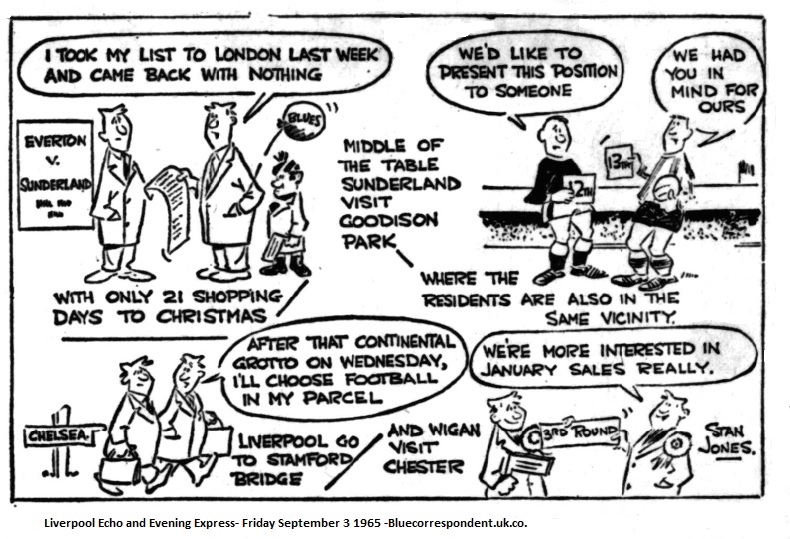
LEAGUE SUBSTITUTE RULE SURE TO BECOME LAW
Liverpool Daily Post- Friday December 3 1965
By Horace Yates
The sooner the Football League’s example is copied universally on the substitute rule, the better will football be for it. For every person who has criticised the experiment now in being, there must have been at least 100 to extol its virtues. The old bogy of abuse has never for one moment manifested itself. Everybody has been eminently sensible in the welcome given to a far-reaching decision. The position of Gordon Milne, Liverpool’s half back in the European Cup Winners’ Cup match against Standard Liege at Anfield on Wednesday night is a case to prove a point. Milne received a kick on the back of the calf, which was not only painful, but caused his knee to balloon ominously. Under League rules there is not the slightest doubt Milne would have been withdrawn. Because substitutes were not allowed in this particular competition, Milne would have been withdrawn. Because substitutes were not allowed in this particular competition, Milne, for fear of letting down his colleagues refused to leave the field, although long before the end he was reduced to walking pace.
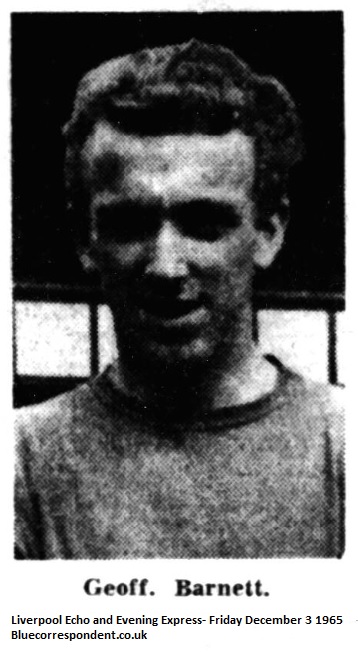
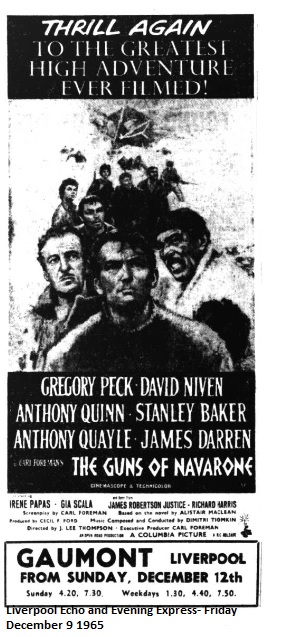
TEENAGERS TAKE OVER FOR EVERTON
The Liverpool Echo and Evening Express- Friday December 3 1965
BARNETT IN GOAL
HURST CHOSEN
By Leslie Edwards
Everton inject two 18- years-olds—one of them for the first time in a Football League match— against Sunderland at Goodison Park to-morrow. They are Geoff Barnett, former Northwich, England Boys and England Youth teamgoalkeeper and John Hurst, also a former England schoolboy international whomEverton have converted from a centre forward to an inside-forward-cum-half-back. Hurst has played for the first teamseveral times before. He will play to-morrow at inside left. Derek Temple is brought back to his best position at outside left and Alex Scott tothe other extreme wingposition after a spell in the reserves.
REPLACES RANKIN
Barnett takes the place of Rankin who has been deputyfor the injured Gordon West. Barnett's excellent Central League performances have earned him first team recognition. At school in Northwich he was advised to continue his studies rather than take up football professionally. He elected to try his luck with Everton and has continued his studies. He is a linguist able to speak French and German. Both he and Hurst joined Everton straight from school. Having ruled Jim Baxter out of the reckoning because of injury. Sunderland immediately released him to join the Scotland World Cup party preparing for their game against Italy, in Naples, on Tuesday. Sunderland's team will be side named for last week's postponed game against Arsenal. Everton; Barnett; Wright. Wilson: Harvey, Labone. Harris: Scott, Young, Pickering, Hurst, Temple. Sunderland.—McLaughlan; Irwin. Ashurst: Harvey, Hurley, McNab: Campbell, Herd, Sharkey, Martin, Mulhall. Everton reserves have no game to-morrow but the Youth team are at Wrexham (3.15) in the second round of the F.A. Youth Cup. Everton Youth; Clarke; Turner, Curwen; Dunleavy, Kenyon, Grant; Whitehead, Royle, Tarbuck, Husband, Rutherford.
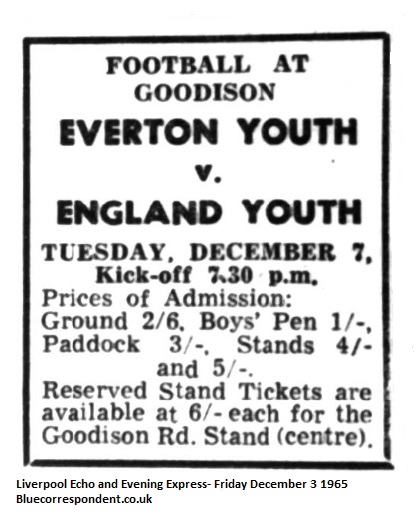
WELL, HERE IS ONE OF EVERTON’S FAULTS
Liverpool Echo and Evening Express- Friday, December 3 1965
By Leslie Edwards
Everton have yet another chance to rehabilitate themselves when they face Sunderland at Goodison Park to-morrow. They played reasonably well, I am told, in London against West Ham and were in sight of a draw when two late goals by their opponents put a misleading slant on the score line. Sunderland themselves are also on the 17 points mark, so there can't be a lot between these sides, but Everton's slide in position has been alarming. Most of their fans, if my mail is any criterion, are far from satisfied with the performance of the team. They make little allowance for the fact that Gabriel and West have been missing through injury for weeks. I believe Everton's fault at the moment arises from a half-back position and in attack on the wings. The essence of football is as much time as space. Movements built from the half-back line are sometimes slowed up by inconsequential weavings with the ball—and the worst thing is that after all these the pass which could have been made earlier is the one ultimately made! Liege showed at Anfield on Wednesday that when you break out of defence the quick through pass to forwards who go ahead with the ball is the move which matters. Forwards who wheel and allow a scattered defence to deploy in depth are defeating themselves. This happens not only with Everton but with many other League teams. Players don't seem to appreciate that manoeuvring with the ball when it comes out of defence are costly indulgencies they cannot afford.
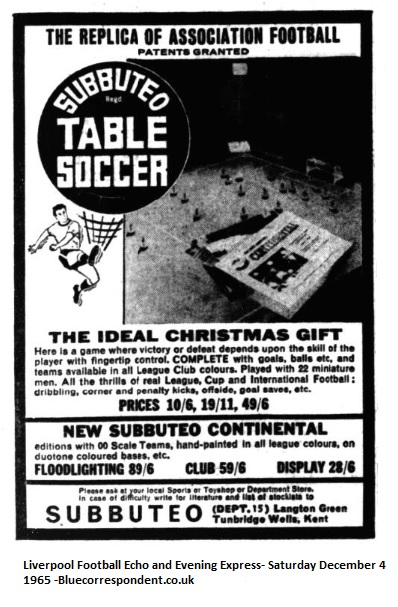
TWO EIGHTEEN-YEAR-OLDS IN EVERTON TEAM TO-DAY
Liverpool Daily Post- Saturday December 4 1965
CATTERICK SWINGS YOUNGSTERS INTO ACTION
GEOFF BARNETT MAKES FOOTBALL LEAGUE DEBUT
By Horace Yates
Everton manager Harry Catterick has wielded the axe in a bid to find a winning combination against Sunderland at Goodison Park today, and one of his changes brings in the eighteen-year-old goalkeeper Geoff Barnett for his Football League debut. Barnett, former England schoolboy and youth international replaces Rankin and another eighteen-year-old John Hurst takes over at inside left instead of Stevens. This will be Hurst’s first appearance in the forward line and his role could be that of link man. Other forward switches are Scott on the right wing for Temple, who goes to the other wing to the exclusion of Morrissey. Everton’s position is worrying and only by striking top form can the conclusion be challenged that new blood is necessary. Some time ago, I was told that never again were Everton likely to spend a Pickering-sized fee on any newcomer, but I doubt if that holds good to-day. Given the opportunity to make their wealth pay dividends, in a practical sense the club, I am sure, would plunge spectacularly.
SCARCITY OF ACES
In the meantime there is little alternative to shuffling the pack and even this exercise is made the more difficult because of the scarcity of aces. Everton should beat opposition who have experienced one victory away from home (2-1 at Blackpool) but whether they do or not surely they must out an end to that depressing scoring record which leaves them without a single goal from three successive games. One has to trace their history back to early September 1962 to find a similarly unrewarding picture. So long ago is it since Everton scored a League goal it is not easy to remember that it was Morrissey who last registered in the home game with Leicester City. However, there is plenty of potential spirit and progress in players like Pickering. Temple and, I hope Young and as Sunderland’s defensive achievements are hardly considerable, to-day should be the day to set the scoring aggregate moving the right way again. If Everton desperately need a win to inspire them up also do Sunderland for both clubs find themselves, for both clubs find themselves only five points removed from the struggling bottom of the table trio- Blackburn Rovers, Fulham and Nottingham Forest. Having ruled Jim Lester out of the reckoning for the game because of injury, Sunderland World Cup party preparing for their World Cup game against Italy in Naples on Tuesday. Everton; Barnett; Wright, Wilson; Harvey, Labone, Harris; Scott, Young, Pickering, Hurst, Temple. Sunderland; McLaughlin; Irwin, Ashurst; Harvey, Hurley, McNab, Campbell, Herd, Sharkey, Martin, Mulhall.
PICKERING AND HURST END GOAL FAMINE
Liverpool Football Echo and Evening Express- Saturday December 4, 1965
EVERTON’S BEST DISPLAY GETS OTS REWARD
EVERTON 2 SUNDERLAND 0
By Michael Charters

The attendance on a wet afternoon seemed as thin as the weather at Goodison Park to-day, for a game made notable by the League debut of 18-years-old Geoff Barnett , in the Everton goal. Groundsman Alan Storey and an assistant were at work forking the ground until just before the kick-off as the persistent rain had made the pitch very heavy. Pickering got a free kick in the opening seconds for a foul by McNab, took it himself and saw the ball skid off a defender into the arms of McLaughlan. Hurst had a shooting chance when Temple nodded the ball down to him, but sent his quick shot wide.
LIVELY OPENING
Everton had opened in lively style, but Sunderland replied with some neat ground football which brought them a chance when Sharkey had dispossessed Labone and Campbell fired in a good shot just wide. After Harvey had put a shot over the bar from 20 yards, Young came up with a better effort which McLaughlan turned away for a corner at full stretch. There had been enough excitement in these opening minutes to warm the crowd. Pickering found the heavy going against him when he tried to bring the ball past Hurley from a great pass by Wright, and the Sunderland defence was able to recover and clear. Pickering hit a wild shot so far off target that the crowd gasped, but despite this miss Everton's forwards were playing bright, forceful football and the Sunderland defence didn't know how to cope with them.
MORE SHOTS
Harvey hit a swerving shot which McLaughlan did well to save, and then Scott, from Young's beautifully placed headed pass, hit another one inches wide of the post.Already Everton's shooting had been more than we have seen from them in a complete match. Apart from the shot by Campbell early on we had seen nothing of the Sunderland attack and Everton continued with one of their best displays of the season to have command of the game. Another fine move delighted the Everton fans when Pickering slipped the ball down the middle to Young, who raced on into the penalty area but, trying a similar shot to his earlier one, he placed the ball away from McLaughlan but also away from the far post. In a rare attack Sunderland came close to scoring when Martin beat Barnett in the air. His gentle header was going for the net when Harris appeared from nowhere to head clear. Pickering was leading the Everton line with considerable power and a great deal of skill. Ashurst, who went to a school off Scotland Road was booed heartily for his repeated body checks to stop Scott, but Everton never capitalised on the series of free kicks they wereawarded.
NARROW MISS
Hurst put a lovely pass through to Pickering who sidestepped Hurley and hit a powerful drive only a foot wide. Pickering was doing everything but score. He went down the left wing from a clearance by Wilson, cut inside in his favourite style, but his shot was still off the mark. Agood run by Scott gave Harris, who had intelligently run into position, a good shooting chance and he took it well, but McLaughlan made a magnificent save at the expense of a corner. This had been the most one-sided 45 minutes of football I have seen this season, but Everton had nothing to show for it despite all their pressure. Half-time. Everton nil, Sunderland nil
Martin Harvey started the second half with a 30-yard shot which dipped dangerously but just over the bar. Conditions were becoming more unpleasant every moment and it was remarkable that the players were able to keep their feet so well on what must have been a pitch like a skating rink. The first save Barnett had to make he did well when he took a shot from Herd after the Everton defence had slipped in the mud.
McLAUGHLAN AGAIN
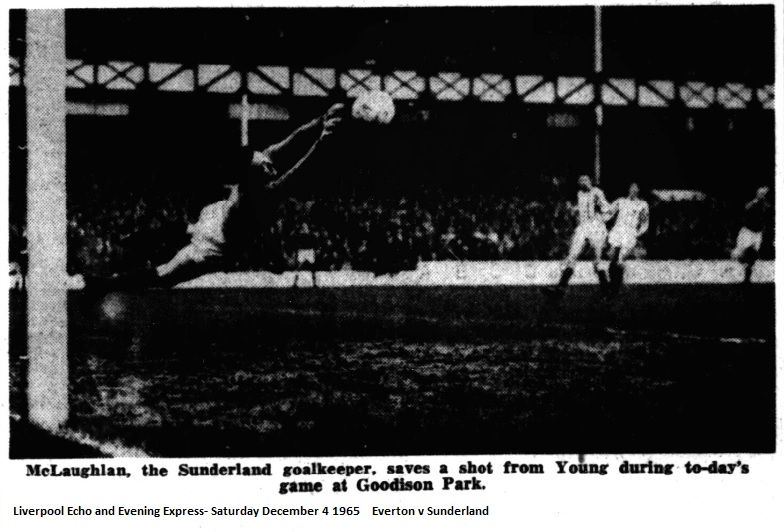
Ashurst saved his side when he deflected over the top a shot by Young which looked a certain winner after a good run by Temple had opened the way, From the corner McLaughlan made another splendid save from a close range shot by Pickering. Small by normal standards of goalkeepers, he had kept his side in the game. The Sunderland goal had an incredible escape when Hurst put the ball into the middle and Temple headed it back for Pickering to flick it away from McLaughlan across the face of the goal, but it struck the inside of the far post and dropped a foot outside the line. Before Young could move to score, McLaughlan had recovered' amazingly and dived on the ball. The Sunderland defence were taking a tremendous pounding but had luck on their side several times. The excitement continued as Everton threw everything into attack, with Labone once acting as outside right. Temple cleverly controlled a centre by Scott to put the ball inside to Hurst whose first-time shot skidded wide off the far post with the Sunderland defence completely baffled by the speed of the move. At last, with 65 minutes gone, Pickering put Everton ahead with a glorious goal —their first in the last four games. It stemmed from a good through pass by Scott. Pickering seemed to have lost the chance when he was tackled by Hurley but he came out of it, pulled the ball to his left foot and from 20 yards hit a magnificent shot into the corner of the net.
GREAT RUN
From the restart Temple had a shot well saved by McLaughlan and the Everton winger made a magnificent run of 60 yards before Irwin got the ball away for a corner.Sunderland were struggling heavily in the mud. The miracle was that Everton's, dominance hadn't gained them a really convincing lead. Hurst continued to impress with his thoughtful intelligent play and he got the ball back to Scott in one move but the winger's shot was magnificently saved. It was only fitting after his splendid display that Hurst should increase Everton's lead after 76 minutes. It came initially from a corner which Young pushed back to Wilson and from the full back's lob Hurst flung himself forward to deflect the ball into the net with a neat header. Several young boys ran on to the pitch to great the goal and the scorer and they could be excused their enthusiasm after Everton's greatly Improved display. Hurst had another chance of a third goal but shot' wide and Everton were now coasting away with victory seemingly in their grasp.
NO WEAKNESS
It had been a fine all-round performance by Everton without a weakness, but Pickering, Hurst, Labone and Harris, must be singled out for special mention. Final:— Everton 2 Sunderland nil. Official attendance: 25,393.
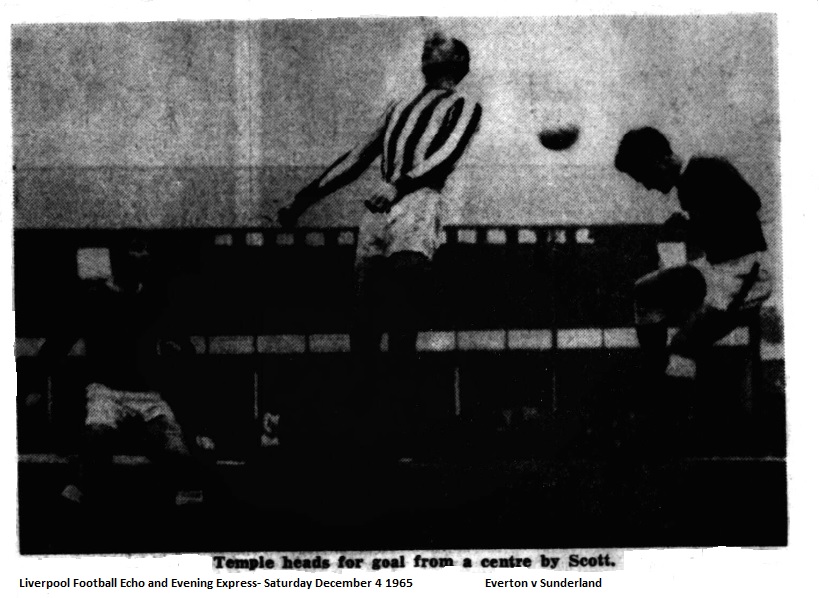
EVERTON A BLACKBURN A
The Liverpool Football Echo- Saturday December 4, 1965
After 10 minutes Humphreys gave Everton the lead. Five minutes later Wallace added another. McLoughlin and Wallace put Everton further ahead. For the last 20 minutes of the half McLoughlin went on a goal scoring spree and put the ball in the Blackburn goal three times. Half-time Everton A 7 Blackburn Rovers A nil
LANCASHIRE LEAGUE
Everton A 8, Blackburn A 1
Everton B 3 Blackburn B nil
WREXHAM YOUTH v EVERTON YOUTH
The Liverpool Football Echo- Saturday December 4, 1965
EVERTON YOUTH MAKE WREXHAM STRUGGLE
Everton's youth side soon had their Wrexham counter-Parts back-pedalling in the muddy conditions at the Racecourse. The Wrexham keeper, Large, was forced to save from Tarbuck and Rutherford. Wrexham made only one attacking move in the early stages as winger Blayney sent Clarke diving to save from a long dive. But for the mud, which made good marksmanship almost impossible, Everton would have had a comfortable lead. Somehow Wrexham survived to the interval after wave upon wave of attacks, Turner. Wrexham's centre half, was largely responsible for keeping Everton out. The home forwards made little impression on Everton's defence. Half - time. Wrexham Youth nil, Everton Youth nil. AfterHusband ran through to give Everton the lead after the restart. Exactly on the hour, referee Mr. K.A. Gale, of Shrewsbury decided that conditions were too bad to continue and the match was abandoned.
EVERTON TURN THE CORNER
Liverpool Echo and Evening Express- Monday December 6 1965
By Leslie Edwards
With only one goal in their four previous League matches, Everton must have faced the game against Sunderland at Goodison Park with many misgivings. The proximity of the Cup draw which affects them; the cold, the rain, the fact that the attendance was down to 25,000 and the first-half goal-less made the interval somewhat chillier than if they had taken their first-half chances. Two or three Everton fans who had obviously written off their team even before a ball had been kicked then produced a banner on which was the legend "Buy Catterick a taxi !" This movement aroused no enthusiasm whatever; clearly people who had seen the new Everton were satisfied that the status quo, with young Hurst and Barnett in the side, was worth more to them than any banner, any legend. I will say this for the Everton performance against Sunderland: the club has never had from all eleven players such sustained effort in conditions which could hardly have been more formidable or testing. It rained from start to finish; it blew coldly; the pitch was treacherously slippery; the mud on it churned up more and more as the game progressed. Everton finally won 2-0 after producing more shots in 90 minutes than they had produced, in total, in their previous four fixtures. If they had been riding high in the table, if their confidence had not been impaired by the sharp slump they have suffered, Sunderland might well have gone home beaten by ten goals -that was a fair measure of Everton's superiority.
Q.E.D. points
This match proved many things. I hope Mr. Catterick, a man who always takes the common sense view of football and of life, will note them. One is that Temple's right place is on the left wing: another that any Everton attack must include both Young and Pickering: a third, and perhaps most important, belief is that the 18-years-old John Hurst has come to stay. He helped to revolutionise the Everton attack. What did he contribute ? Size, ability, a goal and such football knowledge that one might have suspected he had been in "big" football for years. Hurst is beautifully built, with strong, long legs that let him skip easily over the mud and make a series of sensible passes, few of which did not reach target. Best of all I liked the way he twice drifted in to make shots. He didn't "blind" the ball. He took it each time with the outside of his instep and both shots were aimed just inside an upright. That both beat the post. as they say, makes little difference. It was the clever, knowledgeable way, be set about taking these chances which was more impressive than the way he headed his goal. If I were the Everton manager I would leave this eleven in no doubt that I considered them worth their places not only for next Saturday. but for the next half-dozens games. In this way he could help them regain the confidence which has seeped away. It was an excellent show from them all—and I haven't begun to tell of the few whose contributions were the crux of victory.
Star performers
I have never seen Ray Wilson play more brilliantly; Labone too, was commanding and excellent in everything he did. Harris played himself into the ground for his club; Young and Pickering also worked enormously hard and, if things had gone their way, must have got a bagful of goals between them. McLaughlan in the Sunderland goal had a nightmare afternoon. He was being shot at from the start. When he didn't make a save the ball usually missed target by a few feet. Every Everton forward and both wing halfbacks contributed to this fusillade of shots in a first-half in which Everton were almost continually in command. Ironically. on one of the few occasions when the debutant goalkeeper. Barnett. was in action Sunderland might well have scored. Harris, standing on the line. removed the ball to safety as it came to him from a gentle header by Martin. While Everton mounted attack after attack it was always possible Sunderland would get a goal from a breakaway. They had the ball in the net from an offside position before Harris did his rescuing act and if they had led 1-0 at the interval it would have been the biggest travesty of football justice ever perpetrated. Fortunately, Everton took, off countless well-made chances in the second-half, the two goals which gave them a particularly well-deserved win. Pickering, after much weaving in the mud, uncorked a wonderful shot almost from a standstill position for the first: Hurst came along soon afterwards to pitch himself headlong at the ball as it arrived from Wilson on the right. Sunderland. even with Hurley back. had no answer to this new Everton. I believe they will be only one of many other sides who will bow to Everton's new-found expertise.
SUNDERLAND AT EVERTON -F.A. CUP TIE
The Liverpool Echo- Monday, December 6 1965
By Leslie Edwards
Both at home—both playing, the teams they met last Saturday! The odds against this draw must have been thousands to one. For Liverpool, who won 1-0 1 at Stamford Bridge on Saturday, it will be a repetition of the Cup semi-final of last season when they beat Chelsea 2-0 at Villa Park. For Everton, whose 2-0 win against Sunderland on Saturday was so heartening, it will be yet another tilt at North- Easterners who came here, in 1935, to contribute to the finest game ever seen in this city, the famous 6-4 after extra time win which took Everton, into the fifth round. At least the coincidence of two Cup games in the city on the same day must make conditions more comfortable at both grounds. Usually, when the sides have each enjoyed home draws. there have been more than 100.000 watching the two games
HOME TIES
With Southport due for a home game against Ipswich, providing they can win that replay at Stockport to-morrow, and Chester with the pick of the bunch so far as Fourth Division clubs are concerned— Newcastle United at Sealand Road—the draw has been very kind indeed to local clubs. Everton have been drawn to play away in eight ties out of nine since the fifth round tie at Burnley in 1962. They have had drawn games in four ties out of five since 1964 season—at Hull City, Leeds United, Sunderland and Leeds United. In their Cup winning 1964-65 season, Liverpool were drawn at home only once —against Stockport County in the fourth round. Everton and Sunderland have met several times before in the Cup. In 1964, Everton lost 3-1 at Roker Park in the fifth round: in 1958 Everton won a replay 3-1 at Goodison Park after getting a 2-2 draw at Sunderland. The 1935 game, the most memorable of them all, is still' talked about by those who were lucky enough to have seen it In that far off murky day. In 1925, Everton having drawn no goals at Roker Park, won the replay by 2-1.
FEW DOUBTS
Everton should have few doubts as to their ability to go further in the Cup if Saturday's evidence of form is any guide. They might well have won by seven or eight goals against a Sunderland who were minus wing half back Baxter, but who had the peerless centre half Hurley back after a lengthy absence.
YOUTH GAME OFF
GOODISON PARK PITCH IS WATERLOGGED
The Youth game between Everton and England should have been played at Goodison park tomorrow night is off owing to the waterlogged state of the ground. The England youth party had a trial game against Liverpool youth eleven at Melwood today. Although it was thought possible that the Everton game might be played elsewhere tomorrow, prospects are not hopeful. Fans who brought tickets for the match can get their money refunded at Goodison Park on production of the tickets.
BROWN HAPPY AT EVERTON
HE DISPELS RUMOURS
An irate Sandy Brown climbed the stairs to Manager Harry Catterick's office at Goodison Park to-day to assure his boss that there was no word of truth in rumours that he was dissatisfied at Goodison Park. The full-back told me today: " I've never moaned or groaned at being in the reserves. I've never been fitter since I came to Everton and the players here are a great bunch of boys. " There'll doubtless be opportunity for me to get back in the first team and when it comes I'll have a good go at it." Johnny Morrissey, also currently out of the first team is said to be unhappy, too. Mr, Catterick commented: "He has said nothing to the club about this. We cannot afford to let experienced players go—especially at this time of the season with the cup-ties coming along."
PICKERING BREAK SPELL
Liverpool Daily Post- Monday, December 6, 1965
TWO GOALS LIFT THE TENSION AT GOODISON PARK
EVERTON 2 SUNDERLAND 0
By Jack Rowe
You could almost feel the tension lift at Goodison Park on Saturday when, at around 4.15 p.m., Fred Pickering whipped a magnificent left foot shot into the Sunderland net from near the edge of the penalty area. Yes, Everton had scored a goal, their first in 335 minutes play, and you could tell how the players and crowd felt about it. I’ve seen goals scored at Wembley greeted with less enthusiasm, but perhaps the Everton players can be forgiven because up to that 65th minute they must have been almost weighted down with frustration and the fear that no matter what they did here was another match which was going to escape them. That Sunderland were still level at that point was remarkable, on an afternoon on which the pitch which inevitably churned up, they had been given what was very nearly the run-around by this much changed Everton side. It was not so much a case of Everton missing chances, but rather of a situation in which their shots-and there were plenty of them- either just missed or were saved by a fine goalkeeper, McLaughan. Sunderland could have been three down at half-time and within ten minutes of the second half starting Pickering had hit their post with an overhead flick. Scott had lashed a shot inches past the foot with McLachlan nowhere and Young had hit a shot clearly bound for the net only to be deflected over by a defender. The longer this went on the more it appeared that Everton were never going to get a goal. I think the players and spectators were feeling that way as well, so that when Pickering’s shot thundered into the net it understandably shaftered the tension. When Hurst made it 2-0 in 77 minutes it sent Everton’s fans home happier than for many weeks. That Everton were worthy the victory there can be no doubt and the win justifies manager Catterick’s changes, but while it was welcome I feel it must be judged in the light of several factors.
WAIT FOR IT
The chief is that Sunderland did not provide the sort of test to make one believe that Everton have rounded the corner completely. It will need success against much more solid opposition to produce real contentment around Goodison Park. Another angle is that the team must have known they were very much an trial. They responded with spirit and enthusiasm and if this is maintained it could be the start of the way back, but it will require a run of matches to show this. Everton did break the recent slump and they did it in a manner which gave us some entertainment on a dreary afternoon. There were times, especially early on, when the football was good and whatever the faults no one could grumble at the lack of shooting. Some of it may have been from too far out, but they did have a go and if goals had not come it would have been a travesty. Sunderland’s response to pressure was negligible. Once Campbell drove just outside and Sharkey had a couple of first timers which cleared the bar narrowly but generally they did nothing to give us a chance of finding out whether Mr. Catterick was right or not in deciding to give the eighteen-year-old Barnett his chance in goal.
BLOODED WITH VICTORY
Apart from the first half when he lost a cross from the left and Harris headed from the line, Barnett was never tested. What he had to do he did competently enough the real challenge to his goalkeeping skill has still to come, but at least he was blooded with a victory and that must be good for confidence. Hurst had more opportunity, I thought he did well. He is big and strong and what must have been particularly pleasing to Everton was the way he came back in the second half after a period when he seemed to go out of the game. His goal was the equal of Pickering’s. he read Wilson’s intention to cross the ball perfectly, made fully 15 yards and was there to make a fine header, which would have left any goalkeeper helpless. A little more speed and Hurst can give Everton a lot of useful service. Another good thing was the return of Scott brought speed to the wing. Temple, in the second half, was able to beat and get away from the full back something absent at West Ham. Pickering also had a good match against Hurley, especially when he moved about and I give a lot of credit to Young. Probably some expect too much from him because one cannot help but notice a lack of tolerance when he does make a mistake, a tolerance which is often there when others do the same. The fact that Barnett had so little to do tells its own story about the defence. Harris and Harvey worked amazingly hard in the conditions, but this was a day when few would care to point a finger at anybody. Everton; Barnett; Wright, Wilson; Harvey, Labone (Captain), Harris; Scott, Young, Pickering, Hurst, Temple. Sunderland; McLachlan; Irwin, Ashurst; Harvey, Hurley, McNab; Campbell, Herd, Sharkey, Martin, Mulhall. Referee Mr. L. Callaghan. Attendance 25, 393.
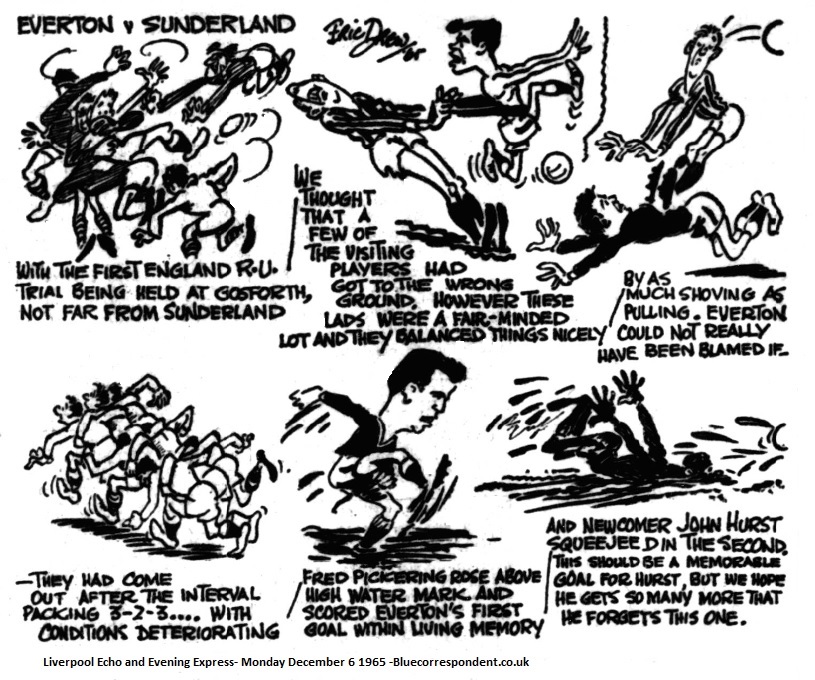
YOUTH GAME WILL BE AT TOWER
The Liverpool Echo and Evening Express- Tuesday, December 7 1965
The Everton Under-19 v. England Youth game will be played to-night (7.30) on New Brighton’s ground at The Tower. A switch was made last night after it had been decided that Goodison Park, the original venue, was too waterlogged. There are two Liverpool players in the England side and the Everton team includes Barnett and Hurst, who played against Sunderland last Saturday. Everton Under-19; Barnett; Curwen, Darcy; Hurst, Smith, Glover; Humphreys, Royle, Tarbuck, Husband, Maher. England Youth; Forester; Craggs, Bentley; Evans, Marsh, Went; Wosahlo, Barton, Reynolds, Bernard, Sumerbee.
HOW LIVERPOOL WENT TO WAR
Liverpool Daily Post- Tuesday, December 7, 1965
By Michael Hardcastle
Great though the devastation of the Port of Liverpool was during World War II- the final bill amounted to almost £11,000,000-it might have been even worse but for the foresight and pre-panning of the Mersey Docks and Harbour Board. As early as 1934, when most of Britain was unable or unwilling to contemplate the possibility of a major war, the Board’s general manager, Mr. (later Sir) Lionel Ashton Piers warner, took the first decisive steps for dealing with any forthcoming emergency. The story of what happened in the offices and docks in the Port of Liverpool during those fateful years before the first shots were fired and the first bombs exploded is recounted in “Western Gateway; A history of the Mersey Docks and Harbour Board.2 Liverpool University Press, 30s by Stuart Mountfield, himself the general manager and secretary for five years prior to his retirement in 1962. “The first real indications of the approaching storm came to the Board and other Port Authorities in 1934 with the arrival of Home Office circulars as to the preparation of air raid precaution schemes, with particular emphasis on poison gas,” he writes; “The general manager took immediate steps to create the nucleus of organisation that was required, but it was not a matter which at this stage weighed too heavily on men already arising from the difficult period that followed hard on the depression. “In October, 1935, however, attention became more concentrated due to the Abyssinian crisis and the delicate international situation that surrounded it. Some little time later the general manager came to the Finance Committee in confidence and asked for a large ‘sum of money.’ Actually the amount involved does not seem to have been of great magnitude. “Someone asked; “Well, whom are we defending ourselves against?” to which the reply was given with a little hesitation, “Germany, and it’s thought in official circles that Italy will join forces with her! “A good deal of quiet preparation and training were put in hand but it was not until July, 1936 that a more serious warning signal appeared. This was in the form of a letter from the committee of Imperial Defence requiring the general manager to set up a Port Emergency Committee in Liverpool.
A GROUP MET PRIVATELY
“A small group of men representing shipping traders railway and road transport, met privately with the chairman and general manager of the Board, and examined many of the problems likely to arise on the basis that a major diversion of traffic from a bombed London and other ports would have to be handled at Liverpool. “Firm in the general manager’s mine was the thought that in the 1914-18 war there had been, on at least one occasion, severity ships lying at anchor in the Mersey awaiting berths.” By the time the Munich crisis had subsided plans had been laid for the darkening of lights on buoys, the closing of subsidiary channels, the sand-bagging of vital points and for the blackout. In fact, the first night alert was not sounded until late June, 1940, but in the following twelve months Liverpool’s port was battered unmercifully. During the war it was closed for a total of 1,310 hours and no fewer than 91 vessels, excluding H.M. ships were sink or seriously damaged. At one time-but for only a brief period-only twelve berths were workable. “Only those who saw the port under these conditions can know what it was like; with ships sunk at odd angles in all sorts of places, long sheds burnt to the ground, great smouldering heaps of debris and roadways blocked with unexploded landmines. Mr. Mountfield is not, of course, concerned solely with the damage inflicted on the port during the six most horrific years of its existence. His task has been to trace the entire history of the Mersey Docks and harbour Board from its institution in 1858 to the present day.
A VOICE ACROSS THE RIVER
He records the acrimony that existed in those earliest days between Liverpool and Birkenhead who feared, with some justification perhaps that their claims were being ignored or overlooked. As late as the turn of the century the Major of Birkenhead wrote appealing for further expenditure for further expenditure on the development of Birkenhead on the development of Birkenhead so that she might be constituted a part of the Port of Liverpool not only in name, but in fact. Somewhat tartly the chairman of the “Board John Brancker, replied; “Birkenhead docks were built before they were wanted and for many years they acted like a millstone round the necks of the Board. Now they are coming into use. When it is shown that there is anything we can do to benefit the Port in Birkenhead it will be done but we cannot provide speculative accommodation which when it is made will not be used.” The Board’s first meeting, at which an M.P and philanthropist was appropriately elected chairman, were held in premises in Canning Place, which were not so apposite. For only a few years later there were complaints of insanitary conditions in the building, which had been built over an old sewer and tidal stream. With some relief the Board then built new premises, which they will occupy. At the time when the Board came into being Liverpool had a population within its boundaries of 375,00 (half of what it is today) and the port handled a trade of some £100,000,000 in value, about a third of the total of the United Kingdom Cotton was the most important commodity and Liverpool claimed three-quarters of the United Kingdon trade with America.
DREDGING AT THE MERSEY BAR
Steam was puffing just over the horizon and the opening of the Suez Canal was only eleven years away. Much further in the future was the matter of the Manchester Ship Canal, which was to cause so much controversy and bitterness in Lancashire; to some aspects of the Bill the Board was, understandably at the time, opposed. Mr. Mountfield deals in detail with land purchasers, extensions, local polities, economics and conservancy (revealing at one stage some procrastination over the vital dredging at the Mersey bar). One reason for the hesitation apparently, was on the ‘ground of costs. They (the Board) were under ceaseless pressure from traders for a reduction of charges and although these same gentlemen would some times support the liner owner in the sacred name of the Port’s prestige they were not so ready to pay for something which would be of primary benefit to carrier rather than the trader? However, in 1890 the decision to get on with the work was taken and it was duly carried out-though at what cost Mr. Mountfield does not say. It is with these words that the author concludes his technical history; The Board has survived a social revolution which has completely changed the relationship between employers and employed. What the future holds no man can say. “Lord Rochdale’s Committee has indicated some of the possibilities of one thing one may be certain-that Liverpool men will not show less courage and tenacity of purpose in their charge than those who went before them.”
LATE SWITCH
The Liverpool Daily Post- Tuesday, December 7, 1965
YOUTH GAME NOW AT NEW BRIGHTON
The Everton Under-19 v England Youth game will be played to-night (7-30) on New Brighton’s ground at The Tower. A switch was made last night after it had been decided that Goodison Park the original venue, was too waterlogged. There are two Liverpool players in the England side and the probable Everton team includes Barnett and Hurst who played against Sunderland last Saturday. England Youth Forster (Sunderland); Craggs (Newcastle), Bentley (Stoke); Evans (Liverpool), Marsh (Liverpool), Went (Leyton O); Wosahlo (Chelsea)Barton (Scunthorpe) Reynolds (Plymouth), Bernard (Stoke), Summerhill (Birmingham). Everton Under-19; (probable); Barnett; Pearson, Darcy; Hurst, Curwen, Yaager; Wallace, Glover, McLachlan, Husband, Maher.
YOUTH GAME
Liverpool Daily Post- Wednesday, November 8, 1965
EVERTON WILT AFTER INTERVAL
ENGLAND YOUTH 4 EVERTON UNDER-19 2
After going in at the interval with a deserved 1-0 lead, Everton wilted in the face of half an hour’s stylish football by the England Youth team at the Tower Ground, New Brighton, last night. They never regained the composure and style they had shown in the final twenty minutes of the first period. The match had been switched from Goodison Park because that ground was not fit, and both sides took some time to accustom themselves to the wet New Brighton turf. Everton settled down and a great run by their inside left Husband, after twenty-six minutes which ended when his shot was pulled down by England goalkeeper Wicks seemed to inspire the Goodison youngsters. Hurst, playing at right half, put Everton in the lead in the thirtieth minute when he forced the ball over the line after Craggs, the England right back, had stopped a header from Everton’s right winger Humphreys on the line.
SWUNG AT BALL
Ten minutes later, Everton should have had a second when Royle, Husband and Humphreys all swung at the ball as it bobbed across goal but were not able to connect. England levelled right from the kick-off in the second half, a fine right-footed drive from the edge of the penalty area by their centre forward Reynolds, giving Barnett no chance. England were looking, the better side and Bentley, their left back, scored with a free kick from twenty yards and again Barnett had no chance. With three second half substitutes England looked fresher in the heavy going and left half Lindsay ran on to a long through ball to score their third in the 65th minute. Four minutes later inside right Barton got a fourth before centre half Smith converted a penalty for Everton.
ENGLAND YOUTH HAD RIGHT SHOTTING IDEAS
The Liverpool Echo and Evening express- Wednesday, December 8, 1965
By Paul O’Brien
England can maintain their impressive record in the international youth team tournament if they show the form which gave them four goals in a 24-minute spell during their match against an Everton Under-19 team, at New Brighton's Tower Ground, last night. Part of the training programme for the 1966 international tournament, this match showed that some of the younger generation of footballers at least are capable of hitting a ball hard goal-wards when they see an opening.
It was this ability thatswung the game in England's favour. for Geoff Barnett, the goalkeeper who made his First Division debut last Saturday, had no chance with three of the England goals, and found the ball spinning unkindly away from him after he bad blocked a shot which preceded the other. Everton the went in at half time with a thoroughly really deserved one goal lead, through right half Hurst after 30 minutes. but it was England, with three substitutes and a positionalchange, who dictated playafter the interval. Within seconds of the restart Reynolds, a most promising centre forward from Plymouth, had beaten Barnett with a superb drive from 20 yards to equaliser, and leftback Bentley (Stoke), left half Lindsay (Bury) and inside right Barton (Scunthorpe) added further goals. Everton, who continued to make raids on the England goal but found the ball notrunning well for them, got another goal through a penalty by their centre half, Smith, after 77 minutes, but by then the game was decided. Evans (Liverpool) at right half, played as well as anyone in the England team, although he did not manage to control Everton's inside left, Husband, all the time. Husband was easily Everton's best forward, but Royale and Tarbuck, the junior members of the side both showed promise. In defence, Hurst had a good first half, but the Goodison's team's covering after the interval left much to be desired. Went (Leyton Orient), left , half in the first half and, centre half in the second, was the youngest player on the field and also one of the most promising, with second half substitutes Piper ( Plymouth), at right back, and Lindsay (Bury). left half, also impressing. Bentley (Stoke) did well throughout at left back. with, Marsh (Liverpool) playing soundly in the first half at centre half before he was replaced.
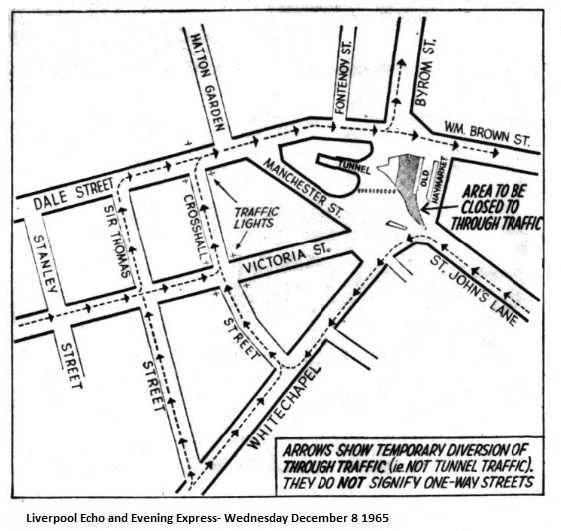
MOVES TO STOP VEHINCLES CROSSING OLD HAYMARKET TUNNELL ENTRANCE
The Liverpool Echo and Evening express- Wednesday, December 8, 1965
AREA WILL BE CLOSED TO THROUGH TRAFFIC
NEW PLAN MEANS MUCH RE-THINKING BY DRIVERS
By Echo Municipal Correspondent
Thirty-one years after the Mersey Tunnel was opened, all traffic—except buses—is to be stopped from driving across the main entrance in Liverpool Old Haymarket to reach Byrom Street and William Brown Street from Victoria Street, Whitechapel and St. John's Lane. The ban comes into force on January 1, when work will start on erecting 11 one-side toll booths in a semi-circle across the Tunnel entrance, further out than the five double-side booths, which they will replace. From that date both Whitechapel and Victoria Street from Crosshall Street onwards will be used as tunnel approach roads only. The Old Haymarket bus terminus will remain and the right-hand lane in St. John's Lane will be for buses turning into this terminus only. The centre lanes will be for tunnel traffic and the left-hand lane for traffic turning left into Whitechapel. Traffic flow into Manchester Street will also continue for the time being.
TRAFFIC LIGHTS
This arrangement is going to call for a considerable amount of re-thinking on the part of motorists who have habitually used the route across the Old Haymarket to travel from the south side of the city to the north. Now, they will have to start thinking very much further, back along their routes which way they are going to get to Byrom Street or William Brown Street. If they have come that far from the south they will be able to turn up Sir Thomas Street or Crosshall Street, then right into Dale Street and so to Byrom Street or William Brown Street. If they are coming down St. John's Lane they will have to turn left into Whitechapel, right into Crosshall Street and so to Dale Street. To make things a bit simpler for them the traffic lights on the Victoria Street- Crosshall Street junction and at the Crosshall Street-Dale Street junction will be brought into operation in advance of the other lights now being installed at various road junctions in the Whitechapel-Tithebarn Street area.
A REQUEST
"We only hope that traffic along Dale Street and Victoria Street will hold back to make room for the traffic crossing Crosshall Street or turning right Into Dale Street," a spokesman for the City Engineer's Department told me. This request is madebecause the traffic lights at the two junctions, designed to work as part of the forthcoming one-way scheme, will be adapted to two-way operation in the interim between January and the coming of that scheme. "Because of that they will not be working to full efficiency," the spokesman said. “It will also be of great assistance to the working of the temporary diversion scheme, and an advantage to drivers themselves, if those drivers who have used OldHaymarket in the past would, whenever and wherever possible, re-route themselves to reach the northerly and easterly parts of the city by means of Dale Street and Lime Street, thus avoiding movement along Victoria Street and Whitechapel,' he added. He said that the closure of Old Haymarket to through traffic is permanent and pointed out that when the central area traffic management scheme is fully implemented next year, drivers will have to adopt a completely different pattern of movement to reach their destinations.
THE NEW BOOTHS
The installation of the new one-sided toll booths and the removal of the existing ones is expected to take about three months, but there should be no interference to the movement of tunnel traffic. As the single-sided toll booths are brought into operation stage by stage it is anticipated that the speed of flow of vehicles into the tunnel can be increased. The type of single-sided toll booth to be installed has been in use at the dock branch entrance for some months on an experimental basis.
WORLD CUP; LIVERPOOL WILL RIGHT IN THE LIMELIGHT
The Liverpool Echo and Evening Express- Wednesday December 8, 1965
PLANS TO ENTERTAIN VISITORS ARE WELL AHEAD
SHOW, DANCES, CONCERTS FOR A SOCCER FESTIVAL
ONE OF THE BEST CENTRES
By an Echo Reporter
A TV programme last night on World Cup arrangements left a number of questions about Liverpool unanswered. Here are the answers: they show that Liverpool will be one of the best World Cup centres for overseas visitors as far as accommodation, entertainment and catering are concerned. A spokesman for the Corporation said to-day: Our plans are coming along very well. We are confident that everything possible is being done to make the overseas visitors welcome. The Council is seizing this opportunity of putting the city in the limelight of the world."
SINCE 1964
Among the facilities planned for the thousands of foreign visitors who will flock to Merseyside next July to see their national teams competing in the world's premier soccer competition, are a special club, reception rooms -and a private entertainment from over 2,000 families. The work of securing accommodation in hotels, boarding-houses and the university halls of residence has been going on since March, 1964. A spokesman for Thomas Gook and Sons, who are handling the problem for the Corporation, said that a large number of rooms had been booked to a 40-miles radius of the city, taking in resorts like Southport and Rhyl, aswell as Wirral and the Chester area. Although no one can say with certainty at this stage, we feel that there will be adequate accommodation for everyone," said the spokesman. There are no plans for using liners as floating hotels as has been suggested for London and Southampton. if any are used in Britain they will be vessels chartered by supporters from their own countries
GOODISON SEATS
Goodison park, which Will be staging five games - including a quarter and a semi-final—will have about 16,000 seats available when renovation work on the Stanley Park stand is completed. A club official said, however, that this would not be the largest number available at the six provincial centres—Sheffield Wednesday will have over 20,000. Nevertheless they were doing everything possible to satisfy all requirements. The stadium will also be the centre of a massive communications organisation to cater for the needs of the 600 Pressmen, radio and television commentators and officials who are expected. The club are also erecting a large marquee on the old practice pitch at Goodison as a reception centre.
50,000 BROCHURES
The Corporation have ambitious plans for entertaining the visitors. The Liverpool Show will be one of the main attractions and a series of dances and concerts are being arranged. Dance partners will be provided from among the girls on the staffs of large city firms. Fifty thousand brochures printed in five languages will give the visitors a complete list of city clubs, theatres, dance halls, restaurants, hospitals, dentists, churches, rates of exchange and maps giving every detail of the city.
HOMELY TOUCH
And if the visitor likes the homely touch, there will be a list of families willing to entertain him in their homes and take him on tours of Wales, the Lake District or anywhere else he would like to visit. In the city centre Recces have given a complete floor of their building to be used as a club for visitors and this will be equipped with radio and television and refreshment facilities. Once the draw is known a special World Cup office will be opened in the Littlewood building in Clayton Square to handle all inquiries. Local preparations for the invasion have been going on under the direction of a liaison committee under the chairmanship of Mr. Ike Robinson, and including corporation representatives, Everton officials, local football organisations, the police, the travel and commercial organisations, the University and transport authorities. Mr. Sid Rudd, the committee secretary, said that arrangements were being made to present visiting teams and officials with mementoes of their visit and that the Liverpool Stores Committee had promised full support and are decorating their premises and arranging special exhibitions of local products and specialities.
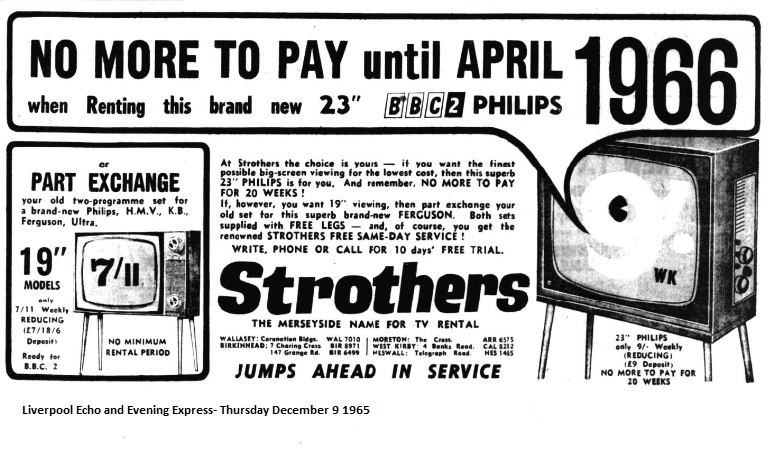
ALF RAMSEY’S MEN ALWAYS MORE ATTRACTIVE SIDE
The Liverpool Daily Post- Thursday December 9, 1965
ENGLAND’S NEW 4-3-3 PLAN BAFFLES THE SPANIARDS
JOE BAKER AND ROGER HUNT SCOFRE IN MADRID TRIUMPH
SPAIN 0 ENGLAND 2
England gave their World Cup hopes a great boost when they beat Spain 2-0 in a friendly international in Madrid last night. It was the first time England had won in Spain since international matches between the two countries started in 1929. England, host country in the World Cup finals next year, raced into an early lead when centre forward Joe Baker scored after seven minutes- following a quickly taken free kick by George Eastham which caught the home defence on the wrong foot. Roger Hunt shot home England’s second goal ten minutes after half time, rounding off a brilliant four-man move. England playing to a 4-3-3 system, frequently baffled the Spaniards by their fluent play and the way they were able to switch quickly from defence to attack. The cold weather kept the crowd in the Bernabeu Stadium- home of Real Madrid -down to 25,000. England shocked the home crowd with a goal in the seventh minute. Eastham caught the Spanish defence on the wrong foot when he quickly took a free kick midway in the Spanish half, awarded for a foul on Bobby Charlton by Glaria. Eastham switched the ball out to Ray Wilson, who put over a low centre. Baker ran on to it and stabbed the ball into the net before the Spaniards had recovered. The goal came at the end of a bright opening spell. In the second minute Hunt had been just too high with a fine shot from twenty yards. Spain soon got into their stride and when Bobby Charlton failed to clear a free kick taken by Reija. Glaria pounced on the ball and was only a foot out with a power packed drive. The groping Banks would never have stopped the ball. Both full backs frequently came up field and Wilson tested Iribar with a rising shot which the goalkeeper just managed to turn over. From the corner Eastham fired over. Spain made their best effort after 25 minutes when Martinez headed in from Ansola’s free kick, but Banks had the ball well covered. England made another good effort when Jack Charlton came up to head in from a corner taken by Ball. Iribar leaped across to clutch the awkwardly bouncing ball.
BAKER LIMPING
Ten minutes from half-time England manager Alf Ramsey called off Baker, who was limping. Immediately Spain reacted Left winger Lapetra fell to the ground holding his right knee and Nemesio Martin (Pontevedra) came on in his place. England started the second half as impressively as they had the first, but Stiles put the England goal in peril with a faulty back pass that failed to reach Banks. England went further ahead after 35 minutes when Hunt scored a good goal following a wonderful four-man move that completely spilt the Spanish defence. Hunt himself started the move with a pass to Bobby Charlton who flicked the ball through to Moore. The England skippers with a slide rule pass, gave Hunt a perfect opening and the Liverpool man pushed the ball in easily with this right fast. Hunter, the Leeds wing half, who had replaced the injured Baker, distinguished himself when he robbed Ansola just in time as the centre-forward was about to put the ball past banks. There was an incident involving Styles and Zoco which ended with the Italian referee awarding Spain a free kick, and the Englishman was in further trouble twenty minutes from the end when he was lectured severely for a late tackle.
RELAXED PRESSURE
England relaxed their pressure in the later stages and Spain took control for the first time. Substitute Memesio Martin had a wonderful chance of putting Spain back in the game, but completely missed his kick ten yards from the goal. The same player had another chance when a shot cannoned off Jack Charlton’s back, but he shot wide. Spain’s attacks were muddled affairs compared with England’s crisp raids. There was more enthusiasm than skill behind them. Ten minutes from time Ball raised hopes of a third England goal when he put over a dangerous centre, but it was breasted away by Zoco. Then Cohen raced through to attempt a late goal, but his centre was just too high for Hunt. Ball and Hunt both missed chances as England piled on pressure against the disheartened Spaniards. The crowd gave the England team a great ovation at the end. Said Spanish coach Hose Villalonga afterwards; “England were phenomenal and they thoughly deserved their win. Alf Ramsey’s comment was “England deserved to win. I say well done to my players.” Spain; Iribar (Atletico Bilbao); Reija (Zaragoza), Sanchis (real Madrid); Glaria (Atletico Madrid); Olivella (Barcelona), Zoco (Real Madrid); Ufarte (Atletico Madrid), Rodrigues (Atletico Madrid), Ansola (Real Betis), Martinez (Zaragoza) Lapetra (Zaragoza). England; Banks (Leicester); Cohen (Fulham), Wilson (Everton); Stiles (Manchester United), J. Charlton (Leeds), Moore (West Ham); Ball (Blackpool), Hunt (Liverpool), Baker (Arsenal), R. Charlton (Manchester United).
FRED. ‘SKIP,’ PAGENDAM CALLS IT A DAY…
The Liverpool Echo and Evening Express- Thursday, December 9, 19265
By Leslie Edwards
Tom Bush, Liverpool factotum and former player, was surprised yesterday to have a visit from 81-years-old Fred Pagendam, the man who has handled Liverpool’s skip-the huge basket containing the players’ gear-since the day the club was formed. “Tom,” said Mr. Pagendam, who is spry and full of fun; “I don’t think I’ll be able to work for the club any longer. You see, traffic conditions to-day are too big a strain on my old eyes. Will you please arrange for someone else to do your skip work in future.” So a link is broken between club and driver dating to days when Everton left Anfield to newly-formed Liverpool and went off to their present ground at Goodison Park. Mr. Pagendam recalls all this and how he used to take players players and skip down to Lime Street or Exchange stations on Fridays or Saturdays in a wagonette drawn by a pair of horses. He was at the station on Saturday night or Sunday to take them back to Anfield. Since horses went out Mr. Pagendam has “skipped” Liverpool’s gear in a trailer behind a 1932 Rolls. This like the driver, has become vintage. The famous radiator crest is in red. Since the second of the famous R.R. men died the monogram has always been etched in black! Fred Pagendam has become, like Joe Hewitt, an Anfield institution. He’s seen countless players, managers and directors come and go. He still sees the occasional game, but his memories, I think are for the heroes of his own middle age- “Waddy,” Tom Lucas, Harry Chambers, Bill Lacey, Kenny Campbell, Sam Hardy, Donald McKinlay, Tom Bromilow.
“Why,” he told, “It was worth a bob to see Harry Chambers play!”
The Pagendam brothers “drove” Everton and Liverpool for years before burned petrol started to desecrate highways. John Pagendam, in coach and four brought Everton back from two Cup finals- in 1906 and 1933. At that time, Fred says, he was merely a back-room boy. He’s always been a Liverpudlian; indeed his boy, Harold, who now lives at Swansea, was an amateur on Liverpool’s books at the time when Charlie Olden (none other than the fiddlin’ and foolin’ Ted Ray of the present-day Music Hall ) was also a Liverpool reserve player. It isn’t everyone who can boast of a working association of sixty years with one club; it isn’t everyone who can handle a Rolls-Royce at rising 82 years Fred Pagendam until yesterday had both distinctions.
THAT 2.30 START
The news that Everton will kick-off against Sunderland on January 22 at 2.30-half an hour earlier than the start of the other Cup games at Anfield between Liverpool and Chelsea may displease some Everton followers, but in this matter their club is completely in the hands of Sunderland. The F.A law says that third-round matches must start at 2.30 unless mutually agreed by the two teams. Sunderland, anxious to catch the a train which will get them home the same might, are clearly anxious to do this and avoid the expense of a night’s stay in this city. Evertonians are suggesting that they will be though to the next round before their Anfield rivals. On the face of things this may be true. The staggering of the kick-off times will certainly give the Liverpool Transport authority a better chance of getting everyone to the matches on time. What price too, the chance of spectators at Goodison Park nipping over to Anfield for the final 30 minutes? Not a hope. Anfield I think will be full to capacity, gates locked, long before the start…
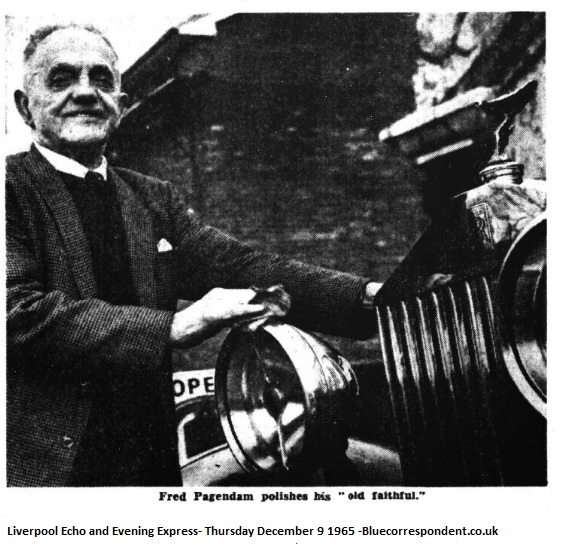
HAPPY HUNTING GROUND
Liverpool Daily Post- Friday December 10, 1965
Everton, who will probably field an unchanged team at Villa Park, have an impressive record on this ground in recent years. Since Harry Catterick became manager they have not lost a League game on the ground and are similarly unbeaten at Goodison Park. The results in the last four visits have been 2-1, 1-0, 2-0 and 1-1. What a boost it will be if that record remains intact to-morrow! Villa’s point at Highbury last week was their first in five successive matches, so that it is hardly surprising to find them relying on an unchanged team. Aston Villa; Withers; wright, Aitken; Parker, Sleeuwenhock, Pountney; MacLeod, Hamilton, Hateley, Woosnam, Scott, Substitute; Tindall.
WITH LESLIE EDWARDS
The Liverpool Echo and Evening Express- Friday, December 10, 19265
Everton face a team needing success almost as urgently as they do-Aston Villa Villa have now gone six matches without a win, though their 3-3 ticket at Highbury last week may be a sign of better things. Their failure may well have been due to the long absence of jack-in-the-box Tony Hateley, a centre forward who rises higher to the ball than anyone since " Dixie." Hateley is back and Brian Labone, who had such an excellent game against Sunderland, will need to put in a carbon-copy performance to keep him off the score register. The Everton manager. Mr. Catterick, was not slow to tell his players following the Sunderland win how pleased he was with their great effort on difficult " going." Were they to reproduce such form they would get at least a point to-morrow. The promise of Hurst is mast encouraging. This latest Everton blend has fully earned right to an extended trial.
EVERTON SAME AT VILLA
WEST AND GABRIEL IN RESERVES
Everton’s team at Aston Villa to-morrow is that which beat Sunderland 2-0 at Goodison Park. The Reserves side to meet Bury at Goodison Park includes West and Gabriel who have been out owing to injury. West broke a shoulder in the Cup-tie against Nuremburg; Gabriel has had only one game in the past five weeks. He is appearing tomorrow at inside right as partner to Shaw. Everton;- Barnett; Wright, Wilson; Harvey, Labone, Harris; Scott, Young, Pickering, Hurst, Temple.
Everton Res; West; Brown, Darcy; Smith, Kenyon, Stevens; Shaw, Gabriel, Royle, Humphreys, Morrissey.
FORWARD COMPETITION
Liverpool Daily Post- Saturday, December 11, 1965
A MATCH EVERTON CAN WIN
By Horace Yates
In a season in which Harry Catterick warned that youth would be served in Everton’s cause, Barnett and Hurst at Villa Park to-day are given further opportunity to prove that confidence in them is not misplaced. Barnett, I gather, despite his debut against Sunderland is still largely untried and it may be easier to assist his qualities after the Villa match. He has done everything asked of him lower down the scale and if he is to maintain his immediate hold on senior football, he must succeed spectacularly today. Gordon West, injured against Nuremburg on October 12, has already had one “A” team outing and plays in the Central League team to-day. Time in the long run, may be on Barnett’s side, but not just now! Compared with Barnett, John Hurst, at inside left, is a veteran of six League games and he has already shown promise enough to give a solid foundation to the hope of better things to come. With Gabriel reappearing in the reserves to-day, the pressure is on Hurst. He has the incentive of knowing that even if Gabriel is considered fit enough to reappear in the first team next week, Hurst’s exclusion will be by no means automatic.
HIGHLY COMPETITIVE
As I see it, Hurst and Alex Young will be showing off their wares to-day in a highly competitive situation. On their display could depend which way manager Catterick will chose when faced with a direct selection challenge. I think Harvey has come to stays at half-back, so that it is the Everton forward line which really is in the melting pot. This situation of playing for places may do much to help Everton out of their present difficulties. The fact that only in one instance this season have they recorded wins in successive matches is a mark of the struggles they have been undergoing. By winning at Villa Park to-day, and I do not rate that possibility in any way beyond them, they would be continuing a dismal Villa record. Since November came in Villa, have taken only one point from the five matches and that was away from home! While Everton last week were scoring their first League goals in four goals games, it is worthy of note that two of their last three opponents have not registered. Surely that is some indication that at last the defence are beginning to find their feet, for this is their most impressive achievement of the season. With the defence in trim again, Everton’s most worrying days must be over.
HATELEY MENACE
Hateley is the menace of the Aston Villa side and Woosnam the brains. Labone has a major responsibility in coping with a centre forward, who is one of the most dangerous of any with the ball in the air. If the Everton skipper leaves Hateley to the headers, except within range of goal, it might be a profitable policy. Hateley’s threat on the ground is not nearly so great. With Hateley contained then, I think is a match Everton can win. Aston Villa; Withers; Wright, Aitken; Parker, Sleeuwnhock, Pountney; MacLeod, Hamilton, Hateley, Woosnam, Scott, Substitute Tindall. Everton; Barnett; Wright T, Wilson; Harvey, Labone, Harris; Scott, Young, Pickering, Hurst, Temple.
BLUES’ GREAT RALLY JUST FAILS TO STOP VILLA VICTORY
The Liverpool Football Echo and Evening Express- Saturday December 11, 1965
ASTON VILLA 3 EVERTON 2
By Horace Yates

Aston Villa; Withers; M. Wright, Aitken; Parker, Leeuwenhoek, Pountney; McLeod, Hamilton, Hateley, Woosnam, T. Scott, Substitute; Stobart. Everton; Barnett; T. Wright, Wilson; Harvey, Labone (Captain), Harris; A. Scott, Young, Pickering, Hurst, Temple, Substitute; Husband. Referee- Mr. G. T. Powell (Newport Man.)
Villa had not beaten Everton in the last eight meetings, and on a soft pitchEverton's first movement began promisingly. Young and Hurst combined to send Scott away, but a free saw the free kick was surprisingly awardedagainst the winger. Barnett, playing in onlyhis second League game, was brought into action immediately to save a fiery shot fromPountney, and responded impressively. A Villa effort deserved a Labone goal if only for its quality. After a move with Woosnam, Scott hit a shot well away from Barnett, just wide. From Young's free kick, awarded for Aitken's obstruction of Scott. Sleeuwenhoek headed out. The heavy ground was a handicap, and Young's pass to Scott stopped short at Aitken.
HURST SLOW
Hurst, a little slow to react to Scott's pass , was dispossessed on the by-line, then Temple shot over. After 12 minutes, Barnett made a superlative save from Hateley,but was beaten a minute later. Hamilton flicked the ball through Everton's defence, and Woosnam, left with the entire goal for his target, scored easily. Wright was playing Temple particularly well, and Woosnam was flicking out, clever passes so that Everton's defence was kept continuously on the alert. Pickering might have equalised in 18 minutes after a move between Scott, Young, Hurst and Temple but the centre forward miskicked. The Everton goal fell a second time in 20 minutes when MacLeod crossed to the left wing. His was charged down and Hateley, lucky to find the ball rebounding to him, lofted the ball over Barnett. A minute later Woosnam chipped his shot only a footover. Harvey disagreed with one of the referee's decisions, and left him in no doubt of his feelings.
BARRAGE
Everton's goal was under abarrage. No sooner had Harris kicked out from Hateley than into the hands of the fallen Barnett. When Withers fisted out from Young, Hurst, cracked the ball first time and wasunlucky to see the shot hit a defender in theface. Temple, put Pickering away at half-Way, but he made heavy weather of a run to theby-line where Sleewenhoek dispossessed him. Harvey, saved the Evertongoal yet again when he flicked the ball from the tall Hateley, who was ideally placed. Villa was certainly not playing like a team who had not known victory in a League, game since October 30. They moved quickly, combined well, and were full of novel attacking ideas.
At 37 minutes Villa scored a great goal. Woosnam took the ball almost to the corner flag, and, as Wilson challenged, made a perfect pass. Hateley moved in and headed past Barnett. Only a superb sideways leap along the ground byBarnett prevented Hateley from claiming a fourth , afterHamilton's shot had been deflected. Half-time.—Aston Villa 3, Everton nil.
Everton's greatest worry was the failure of the wing halves! To maintain contact with Woosnam and Hamilton, and now a link-up between Hamilton and Hateley gave Woosnam a chance, and Barnett only just got the ball under control. Everton had still not tightened up their watch onWoosnam, then Temple appeared to be fouled, but saw the free kick given against him. He ceased his protestations only when the referee threatened to take out i his notebook. Wilson raced across to prevent Woosnam's pass reaching Hateley, who was beginning to get the better of Labone in the aerial battle.
FINE RUN
A wonderful run by Everton's Scott, in which he beat three men, ended with a pass to Wright, who was injured in a tackle, but resumed after attention. Temple put the ball at the feet of Young, but Withers saved. Tommy Wright obstructed Villa’s Scott and from the free kick a flying header from Hateley soared over the bar. Aitken intervened when a Young shot was deflected towards Scott, and play was held up when Hamilton accidentally kicked Wilson on the leg. The Everton back had to be treated by the trainer, and resumed limping. MacLeod whipped the ball across and Woosnam lifted the ball only inches over. Everton hit back splendidly with a goal at the hour. The credit was almost entirely Scott’s. he hoodwinked Aitken by allowing the ball to pass through his legs, then, challenged by Aitken and Pountney, beat both and centred perfectly to the head of Pickering, who steered the ball away from Withers.
BLUES AGAIN
From free-wheeling, Villa found it necessary to slip into gear again, and Woosnam’s clever pass was negatived when MacLeod failed to get past Wilson. Scott was fouled by Aitken and retaliated immediately. He was spoken to by the referee, but Everton got a free kick and in 65 minutes Hurst flicked the ball into goal. Scott had played a leading part in Everton's recovery. They we're a team transformed Scott combined with Harris in a move which threatened to cut Villa to ribbons. Barnett rescued Everton byknocking down a drive fromWoosnam, who damaged his leg in the attempt. The referee had a word with Labone and Woosnam. Temple beat two men buthis centrewas just toopowerful for Pickering. Everton' s revival was remarkable, and much of Villa's composure had gone. MASSED DEFENCE
A free kick for a foul onPickering just outside the penalty area saw the centre- forward crash the ball at the massed defence, but a couple of foot wide. Everton swarmed around the Villa goal, but thenearest Pickering could get to a goal was a hooked shot about a foot over. Final Aston Villa 3, Everton 2. By my reckoning the referee played five minutes short, making no allowance whatever for the second half injuries. Estimated attendance 18,000.
EVERTON RES v. BURY RESERVES
The Liverpool Football Echo and Evening Express- Saturday December 11, 1965
Everton Res.- West; Brown, Darcy; Smith, Kenyon, Stevens; Shaw, Gabriel, Royle, Humphreys, Morrissey. Bury Res; Ramsbottom; Bain, Eastham; Alverson, Clunie, Lindsay, Roberts, Griffin, Owen, Kerr, Clayton. Referee Mr. B. Parker (Leeds). Bury took the lead after nine minutes. The goal resulted from a beautiful three-way move between Owen, Griffin, and Kerr, with Owen taking the final pass and beating West. Everton’s smaller forwards were finding the big Bury defence a stumbling block, but they did have a chance after about 20 minutes. Morrissey put across a lovely centre for Shaw, but he waited just that bit too long and Ramsbottom got into position. Then a Bury defender headed off the goal-line from Gabriel. Everton scored twice in two minutes, both goals stemming from Royle. The first one he scored himself from a Morrissey centre at 26 minute and the second came from Humphreys after Royle had centred from the right. Everton got a thirds goal at 44 minutes when a Shaw shot trickled across the line out of Ramsbottom’s reach.
Half-time; Everton Res 3, Bury Res 1.
IF THE OPPORTUNITIES COMES TO SPEND BIG, THEN EVERTON MUST SPEND
The Liverpool Daily Post- Monday, December 13, 1965
FAILURE TO MEET AND AMSTER THREAT IS COSTLY
SCOTT SPARKS A THRILLING RALLY THAT JUST FAILS
ASTON VILLA 3 EVERTON 2
By Horace Yates
For lack of one dominating personality, able to direct and inspire by leadership and example, Everton failed at Villa Park on Saturday. In the end it was a glorious failure of as thrilling a fight-back as Everton are likely to stage this season. Any number of extenuating circumstances can be advanced to explain why they did not pull back a three goal deficit, which at one time appeared overwhelming. The real tragedy was that they should ever have allowed themselves to be confronted with such a handicap. Whether their No. 1 requirement is a half back, or a forward may be a matter of opinion, but what is clear is that in their present stage of development there is not a player on their register immediately capable of fulfilling the highly important role. Where he is to come from is not clear, but if one day soon the market should throw up such a man Everton cannot afford to miss him on financial grounds. The suggestion has been made that Everton will never again embark on a signing as costly as was Pickering. This is old fashioned thinking and if ever that represented official club policy, I hope it no longer applies.
SECOND BEST ROLE
If the type of player should become available, capable of hastening a rescue act then Everton cannot afford to count the cost too great, against Villa, in the first half of toil and struggle, it was distressing to see Everton settling into an acceptance of a second best role. Villa established a superiority through some splendid football, so much of it inspired by the dominance and skill of Hamilton and Woosnam. The Everton half backs failed completely to get to grips with the challenge and not until the second half was it apparent that they had realised where they were falling apart and what sort of action was required to apply a remedy. Once Everton faced up squarely to the threat and mastered it, so did the pendulum swing in their favour, so that in the end it was not stretching facts at all to suggest they had made themselves worthy of a point. For all their disappointments, the foundation for a successful Everton side is there. Wingers like Scott and Temple who had been just making up numbers during the Villa ascendancy, were suddenly brought into more frequent action and the result was electrifying Scott, with his greatest display of fast, aggressive attack for many a long day, led the revival and Temple was not very far behind him. They wrecked the composure of a defence which had seemed more than adequate for the sort of challenge likely to come their way, suddenly had their limitations exposed. Instead of a cool authority there was often panic and confusion and when Villa responded by doubling up defensively on this new threat, they were still not able to contain it.
FIVE MINUTES SHORT
The result was that Everton became such a proposition that possibly they might still have extracted something from the ruins if time had been allowed to run its course. According to my calculations the referee terminated the match 45 minutes precisely after the start of the second half. Lengthy attention to Wilson, Woosnam and Wright, with several others shorter breaks for treatment by trainers to other minor injuries, added up to five minutes of lost play. This was confirmed by an official stop-watch timekeeper in the Press Box -but not a minute was added. The referee declined to discuss the matter after the game and although quite obviously he is the sole judge of time, only Villa were pleased at the premature termination of an assault, which had them rocking dangerously. There are those who are saying that Pickering had lost his punch and much of his effectiveness. What rubbish! He suffers only from malnutrition in the football sense-food in the shape of intelligent co-operation. Pickering is a finisher. To expect him to make as well as take goals as a matter of course is a demand made on few.
GREATER SPEED
Young flattered with a breezy opening, which was not sustained and Hurst, although taking his goal very encouragingly, is clearly confused by the greater speed at which a player in League football must react, compared with the more leisurely approach of play lower down the scales. Some of his distribution was highly encouraging. Villa showed their intelligence in so caging in Temple that however much progress he made on the wing, his lethal cut inside and shot were never allowed to materialise. Labone tried hard to contain the menace of Hateley and only partially succeeded, but Wilson and wright gave a workmanlike show. Young Barnett in goal, now knows what it is like to concede goals in the First Division. His consolation will be the knowledge that even with Rankin or West in his place Villa would still have scored three goals. I did not fault him with any of them and several of his saves showed clearly that the reputation he is building is on solid foundation. Pickering had one shot kicked almost off the line, with the goalkeeper beaten and another struck a defender with Withers nowhere. It was Hamilton, who created Woosnam’s opening goal in thirteen minutes and Hateley’s opportunism in making the most of a rebound produced the second in twenty minutes. The third a picture goal was the product of superb play by Woosnam and a brillaint header by Hateley. Everton’s first retaliation on the hour was another specular affair, with Scott achieving wonders in twice losing the ball and regaining it in a one man tussle with three defenders. He crossed his centre perfectly for Pickering to rout the critics with a header away from Withers, that could not have been excelled. Five minutes later Hurst produced an admirable side flick, after a concentrated siege on the Villa goal. For the rest Everton were restricted to brave attempts and narrow failures. That first half Everton lassitude was distressing in the extreme but the magnificence of their recovery deserved to wipe the slate clean- and so nearly did. Aston Villa; Withers; M. Wright, Aitken; Parker, Slueeuwehoek, Fountney, MacLeod, Hamilton, Hateley, Woosnam, T. Scott, Substitute Stobbart. Everton; Barnett; T. Wright, Wilson; Harvey, Labone (Captain), Harris; A. Scott, Young, Pickering, Hurst, Temple, Substitute Husband. Referee; Mr. G.T. Powell (Newport) Attendance 18,712.
CENTRAL LEAGUE
The Liverpool Daily Post- Monday, December 13, 1965
EVERTON WIN AFTER BEING IN ARREARS
EVERTON RESERVES 3, BURY RESERVES 1
Two goals in as many minutes gave Everton Reserves the lead after being a goal down against Bury Reserves in the Central League game at Goodison Park. Their football was not as neat as the visitors, but only good goalkeeping in the second half by Ramsbottom saved Bury from a heavier defeat. Bury went in front at nine minutes through Nei, after a heat triangular move, but at 26 minutes Royle headed a good equaliser, and a minute later gave Humphreys a perfect centre from the right wing. Shaw got Everton’s third goal at 43 minutes. The second half though goalless produced some good moves from both sides who kept up a fast pace on a heavy ground up to the end.
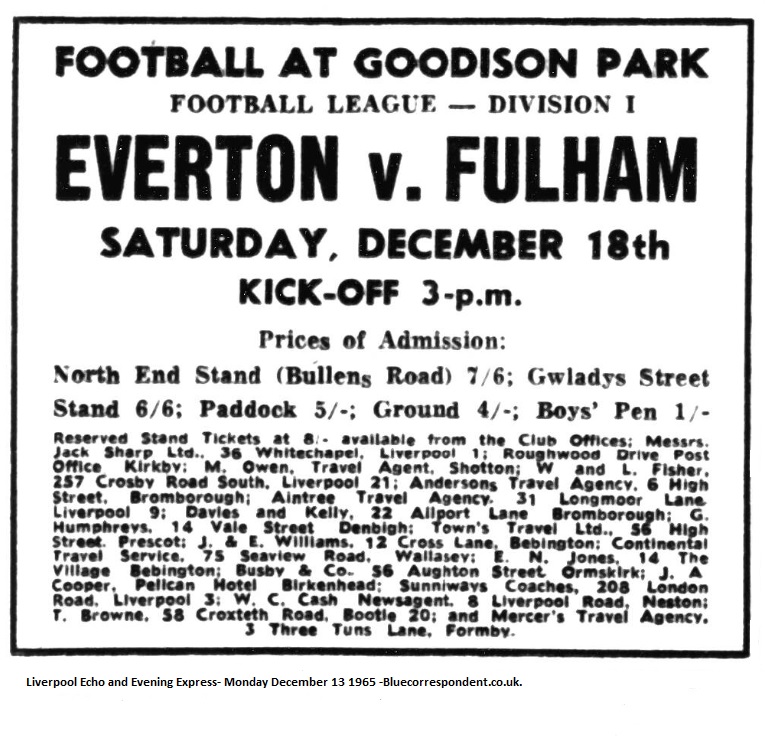
EVERTON’S GREAT NEED IS A COMMANDING PERSONALITY
The Liverpool Echo and Evening Express- Monday, December 13, 1965
By Horace Yates
Everton set themselves a crippling handicap when they fell three goals in arrears to Aston Villa before half time and yet, with a remarkably spirited revival pulled back two goals. They were exerting such pressure at the end that if the referee had allowed the five minutes lost through injuries who can say whether or not Villa would have got away with both points? Everton must have been kicking themselves for being so slow to deal with the twinthreat posed by Hamilton and Woosnam, who were given far too much room to exploit their cleverness before the clamp down came. With Hateley in spirited mood, challenging for every ball and showing an opportunism that kept, Labone extended, the forward thrust of this Villa side belied their recent run of failure. They played some lovely football and almost always it was either Woosnam or Hamilton, or both, who sparked the movements.Although one side of the ground was out of use because of the re-seating operations taking place in preparation for the World Cup matches, there was still ample accommodation for a crowd small enough to show how Villa's hold on the public has slipped in recent times.
REVELATION
During that first half ascendancy it was difficult to see what more could have been expected of any team, but their limitations were exposed when Everton began to dictate. Scott's display was a revelation. For a man who has been so much out of touch this season, his come-back to peak rating was remarkable. It was his good work that produced both Everton goals and there could have been others. Aitken was so badly beaten, powerless to deal with the winger, that he resorted to foul after foul to help him out of difficulties. I have not seen Scott in such a dominant role for a long time and Temple responded with touchline runs that clearly showed him to be in his rightful position out on the left. Wherever Everton may. experiment in the future I hope Temple will be left alone to develop full power in a position which has seen him rise from obscurity to international status.
CRITICS ROUTED
If Everton's inside forwards had been in any way comparable to Woosnam and Hamilton what a very different picture would have been painted. for I considered with his limited chances that Pickering achieved quite a lot.He routed the critics who maintain that he cannot use his head. The header with which he beat Withers to begin Everton's fight back was a masterly effort, judged to perfection. He had previously shown almost equal skill in rounding Withers and shooting from an acute angle for the open goal only to see Aitken race across to kick cleat when a score seemed certain.
HURST'S PROMISE
Hurst's promise is abundantly clear. He flicked the ball past Withers like an expert for Everton's second. If he could be given a run of half a dozen games or so as an inside forward. I am convinced he would be a vastly different player. His greatest failing at the moment is the difficulty he is experiencing in stepping up his reactions to the increased tempo of League football and this is something only experience can give him. Some of his distribution was of real quality suggesting that when he does finally make the grade It could quite well be in his original position as half back. Until Everton can adequately replace Kay their success may still be limited, for they have no commanding personality at the moment to prevent a crack from becoming a gulf. It took far too long for Everton to detect the cause of their trouble and take steps to deal with it.
NEVER OVERAWED
Harvey, willing as ever, often seemed to be caught up In a dual defensive responsibility that restricted his effectiveness and Harris was never the dominating character he can be. The backs were steady enough and I do not fault Barnett in goal for any of the scores. At least two of his saves suggested that the quality is there and he was certainly never overawed by his responsibilities. If only he had been introduced immediately West was injured his progress might have been spectacular, but of course, in view of Rankin's far greater experience the re med y seemed self-evident. Woosnam opened the scoring in 13 minutes to pay tribute to Hamilton's astute pass, but there was an element of luck about the second scored by Hateley. He deserves every credit however, for the quickness of his reaction after MacLeod's centre had been charged down. It was Woosnam who created the third with a commendable solo effort, which Hateley completed with a beautifully directed header (37 minutes). Pickering's reply (60) from Scott's cross was equally spectacular, for his header was a winner all the way. Hurst's goal (65) came from a free kick awarded for one of the many fouls against Scott. If ever a come-back earned a point I thought this retaliation by Everton certainly did, but the score stayed at 3-2 to the end.
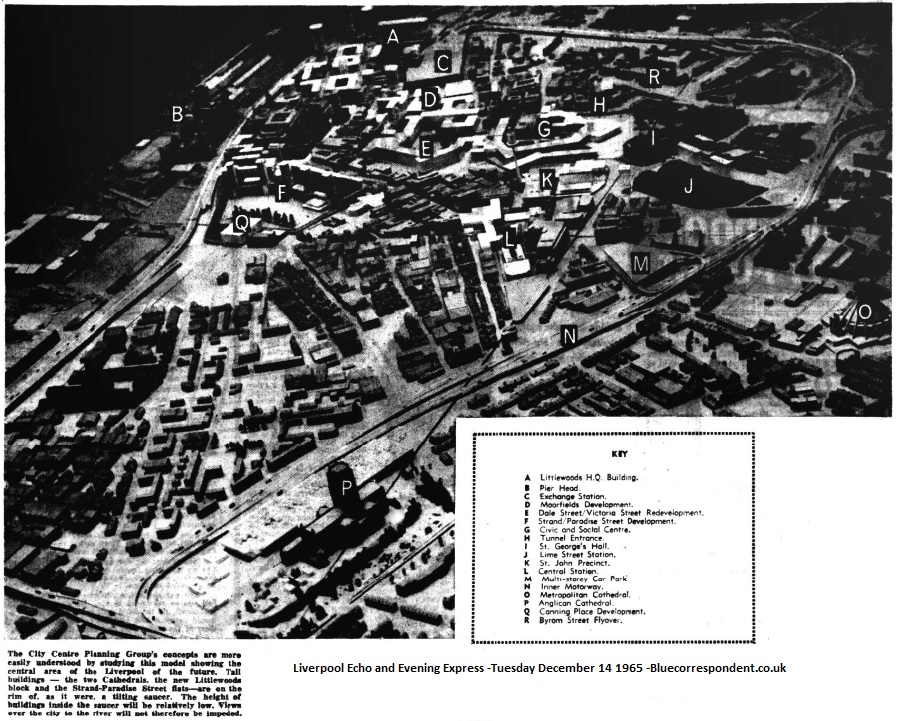
GIVING LIVERPOOL NEW HEART WILL COST £33,000 A DAY
The Liverpool Echo and Evening Express- Tuesday, December 14, 1965
£28 M FOR ROADS IN FIRST FIVE YEARS
START WILL BE MADE ON CIVIC AND SOCIAL CENTRES
PEDESTRIAN ROUTES
By Echo Municipal Correspondent
To re-development £33.000 a day. This is the rate of expenditure which Liverpool faces for the next five years of its overall plan to re-shape the city centre. The estimated cost of the first five-year phase of the scheme is £66,000,000. This overall plan—the result of research and planning carried out over the past three years—is now available in book form. It has been issued by the City Centre Planning Group which consists of members of the city planning department together with the city's planning consultants, Shankland Cox and Associates. The group is directed by Mr. Walter Bor, the city planning officer and Mr. Graeme Shankland. The book's aim is to produce a coherent picture of just what Liverpool's inhabitants can expect to see happening between now and 1981. Included are details of the first five-year phase.
WALKWAYS
What will the city be getting in this period for £33,000 a day? Major road works, including the northern section of the Inner Motorway, will take the largest share—rather more than £28,000,000. The Bill which will enable Liverpool to acquire land and to construct the Motorway is already in Parliament and is expected to become law next session. The next highest expenditure, about £26.000.000, will go to the comprehensive development areas. These are sections of the city centre, of varying sizes, which have been selected for concentrated reshaping. In them, the Corporation will acquire the land and after the clearance of the majority of the existing buildings, re-shape them with new roads and pedestrian walkways (some of which will be above ground level), and with shops, or houses, or industry or entertainment facilities, or with a combined development.
CIVIC CENTRE
Included in the first five-year programme are the Strand-Paradise Street area, about 25 acres; four acres centred on Clayton Square; and 18 acres around Moorfields. There are also comprehensive development areas planned for Old Hall Street and St. Paul's Square, for Brownlow Hill and Mount Pleasant, for the London Road and Islington area and for Williamson Square. The first part of the civic and social centre is included in the five-year plan. This will cost some £3,000,000 and will be situated between the existing municipal building in Dale Street and St. George's Hall. The re-location of existing businesses displaced by the schemes will cost Just over £1,000.000. The acquisition of land-other than that included in the Motorway and the comprehensive development areas—will account for just over £1.000,000 while a further £3.000,000 has been allotted for miscellaneous schemes. By 1971 one essential feature of the re-development, the provision of traffic free walkways for pedestrians, will be completed. The existing and the new tunnel under the Mersey will be connected to the Islington-West Derby Road new radial route by the first section of the Inner Motorway. The Byrom Street fly-over across the Tunnel mouth will be ready. There will also be a large roundabout at the junction of Roe Street and Hood Street, between the present Queen Square and Williamson Square. This roundabout wilt serve to keep traffic out of the main shopping area around Church Street.
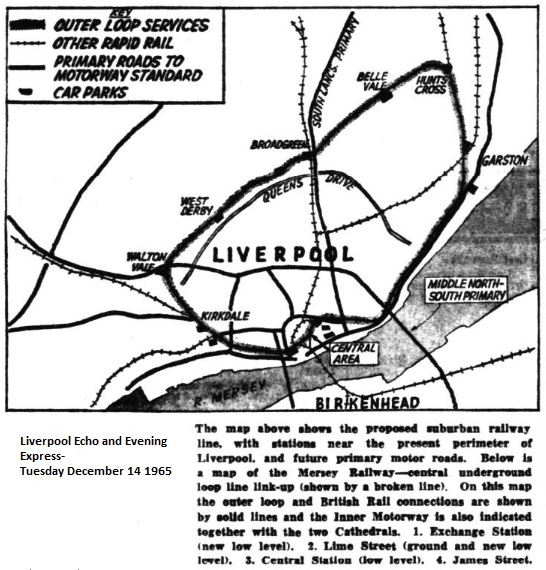
TWO LOOP LINES
The Liverpool Echo and Evening Express- Tuesday December 14 1965
MAIN STATIONS LINKED UP
While the Inner Motorway and its related primary roads providing connections north, east and south of the city will do a great deal to ease traffic conditions within the city and help greatly towards the realisation of central area meant for pedestrians and not for vehicles, proposed improvements to the city's rail services will also make towards much easier communications. Proposals to increase carrying capacity of Mersey Railway include certain works at Hamilton Square Station to enable the lines for New Brighton and West Kirby to avoid the for Rock Ferry so that number of trains that canbe run at the same time can be increased. But the major proposal is that to extend the Mersey Railway in Liverpool so as to form an underground circular line from Central Station to Lime Street Station and Exchange Station and then to James Street. This would give passengers arriving from Wirral the choice of using whatever station suited them best, and would also make possible through links for electric trains from Southport and Ormskirk under the Mersey to Wirral. Further work to lower the level of the main line at Central Station to link with the Mersey Railway at Low Level would mean a similar link to the south of the city. Connected to the Mersey Railway Loop is projected an Outer Rail Loop which would mostly utilise existing lines and provide a fast service of electric trains around the city. To the south it would follow the line of the existing railway from Central Station to Garston where it would swing east to Hunts Cross and then north to Belle Vale. Broadgreen (where the main line would provide a link into Lime Street), Broadway, Walton Vale and then back again, south-eastwards, through Kirkdale to Exchange Station. The planners envisage population centres developing around stations on the Outer Loop and even the development of industries attracted by the facilities offered by the railway. Within the loop, buses would carry commuters from their homes to the nearest station, and It would be found in most cases that the joint bus-train trip into the city centre would probably take much less time than the same journey by bus takes to-day.
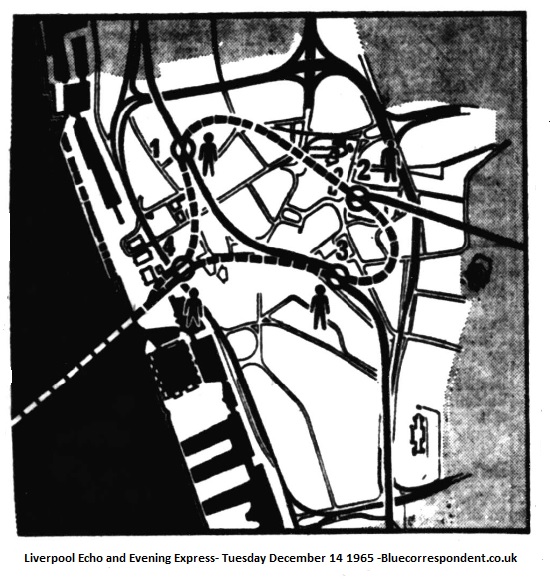
GABRIEL IN EVERTON 13 TONIGHT
The Liverpool Echo and Evening Express- Wednesday, December 15, 1965
GREGG BACK FOR UNITED
ONLY CHANGE
By Leslie Edwards
Gabriel, the wing half back, who has not played a first-team game for many weeks owing to injury, is among the 13 players from whom Everton will select their team to meet Manchester United to-night (7.30), at Old Trafford. The thirteen are; Scott; Temple, Wilson, Labone, Hurst, Young, Barnett, Pickering, Gabriel, Harris, Harvey, Wright, and Husband. The match is a rearranged First Division game. Everton have a home game on Saturday against Fulham. The pitch at Goodison Park has had some forking to help it absorb the heavy rain of the past week or two. Goalkeeper Harry Gregg whose suspension is now over, is recalled by Manchester United tonight and he takes the place of Pat Dunne/. This will be the only change compared with that which won at Sunderland on Saturday. Manchester United; Gregg; Dunne (A), Cantwell, Crerand, Foulkes, Stiles, Best, Law, Charlton, Herd, Connelly, Substitute, Aston.
INTERNATIONAL
For the international match, England v Poland, at Goodison Park on Wednesday, January 5 (7.30 p.m.). reserved tickets for all stand seats are now available as follows;-
Goodison Road and Bullens Road (upper) Stands; Centre front 30s, centre rear 22s 6d, sides front 22s 6d, sides rear 15s. Lower stands (Bullens Road); centre front 22s 6d; centre rear 15s sides fronts 15s, side rear 10s. Gwladys Street Stand; Front 15s rear 10s. all applications by post should include correct remittance and stamped addressed envelope, and the outside of the envelope should be marked “E. v. P.” Priority will be given to stand season ticket holders who should enclose spare voucher No.3 with the application and mark the outside of the envelope “Season Ticket E. v. P.” Admission to the ground and paddock will be by payment of cash at the turnstiles on the day of the match as follows; Paddock 7s 6d. Ground 5s Boys Pen 2s 6d.
EVERTON LACKED A GENERAL, BUT
Liverpool Daily Post- Thursday December 16, 1965
UNITED HAD BEST FORWARD ON OLD TRAFFORD PITCH
MANCHESTER UNITED 3 EVERTON 0
By Ian Hargreaves
The score-line suggests that Everton were victims of a Manchester massacre under the Old Trafford floodlights last night- but the fact is that they carved out more than their share of half chances, but fell down completely when it came to turning them into goals. This is not so much in indictment of their marksmanship, as of a policy which sent them on to the field with a hopelessly ill-assorted forward line. At the last minute, Manager Harry Catterick decided to leave out Alex Young, the nearest approach to an Everton schemer and to field Gabriel and Hurst at inside forward presumably because the pitch was so heavy that play was doubtful until shortly before the kick off. The result was plenty of strength and determination and an almost complete absence of the kind of generalship supplied in the past by such masters as Collins and Vernon. Although Pickering generally had the beating of Foulkes when the ball was on the ground and Scott’s speed made Campbell look like a veteran in need of his slippers, there were few combined moves once the halfway had been crossed. All to often it was a case of an isolated individual sortie failing bravely in the face of overwhelming numbers. Long before the end Everton’s only hope of a goal seemed to be from defenders missing one of the innumerable high centres flung hopefully into the goalmouth. This was particularly unfortunate as many of the Everton team played well enough to deserve a better reward. Labone and Harvey were sound in midfield and full back Roy Wilson vied with United’s George Best for the distinction of being the night’s outstanding player. This may sound a little strange in view of the fact that technically Wilson was supposed to be guarding the little Irish Will o’the Wisp. However, as many of United’s opponents have found to their cost Best never remains in one position for more than a few seconds and is almost certain to pop up unmarked appears. Best’s ability to find the open space served United well last night, since his unexpected incursions were directly responsible for all three of their goals. The first, in the 16th minute, was a little masterpiece, an example of effortless artistry that must have made all neutral spectators mourn the fact that Best will not be decorating next summer’s World Cup finals. He drifted into an open space on the left wing, picked up a through pass by Crerand; held off a tackle by Wright, showed the ball invitingly to Everton’s unhappy goalkeeper Barnett- and then planted it in the net.
POPPED UP TWICE
Best would have had another goal soon after had Wilson not kicked a fierce shot off the line, but as it was he popped up twice in as many minutes shortly after the interval to settle the issue. First he pounced on a quick corner by Connelly and placed the ball perfectly for Herd to score, then he ran 50 yards to dispossess Wright and open the way for Charlton to blast home an unstoppable shot from close range. Best’s performance was by no means one of glorious isolation. Charlton, lying unusually deep, controlled the direction of attack with calm precision as Law showed flashes of his genius. The old dash is still there only in flashes, but there are few people who can match his ability to control, shield and use the ball. Stiles was as busy as ever alongside Foulkes and Crerand made many telling passes but United’s happiest defender was undoubtedly goalkeeper Happy Gregg. Back after suspension he made several fine saves and after a jittery start seemed to have regained his confidence before the game was over. A pity Everton’s forwards had to help him. If they had someone to act as general in place of the ill-at-ease Gabriel, Gregg’s home coming might have had a very different ending. Manchester United; Gregg; Dunne (A.), Cantwell; Crerand, Foulkes, Stiles; Best, Law, Charlton, Herd, Connelly. Everton; Barnett; Wright, Wilson; Harvey, Labone (Captain), Harris; Scott, Gabriel, Pickering, Hurst, Temple. Referee; Mr. E. Crawford (Doncaster) Attendance; 32,624.
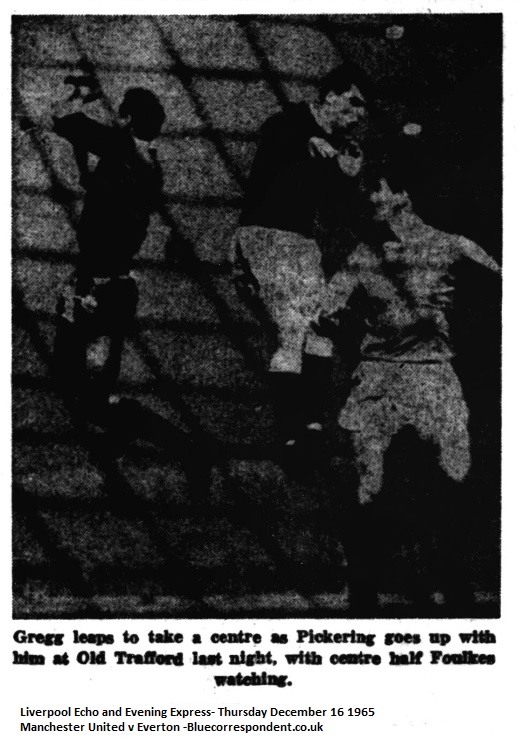
RAILWAY UNDER THE MERSEY
The Liverpool Echo and Evening Express- Thursday, December 16 1965
Railway Under The Mersey
By George Eglin
IT ALL BEGAN just 100 years ago when Parliament gave permission for the first hole to be bored under the River Mersey. The hole was to be the start of a fantastic venture, a Mersey Pneumatic Railway on which trains were to be sucked under the river as cash is still hurtled from sales counters to the cashier's tills in some shops to-day. The man with the fantastic idea was Sir Charles Fox, a civil engineer who was inspired to think of a pneumatic railway by the success of a pneumatic tube installed by the Post Office in London to carry mailbags between Euston Station and Holborn sorting office. The pneumatic railway was never built. Merseyside businessmen laughed at the thought of investing money in such a project. Yet Fox had the right idea. A railway under the Mersey was badly needed, and five years later, in 1870, an orthodox double-track line was authorised, to link the London and North Western and Great Western joint railway in Birkenhead with a new terminus in Liverpool's Whitechapel. Investors were still doubtful. The new Severn Tunnel was in trouble with flooding, a rush of water had drowned 20 men in a tunnel under New York's Hudson River, and another tunnel in Detroit had been abandoned because engineers could not cope with flooding Men with money to invest asked themselves whether a Mersey underground railway could even be built—and if it could, whether it would pay its way at the proposed fare of one penny. Their answer amounted to refusal to produce the £900,000 needed to build the line. Yet, optimistically, work on sinking shafts was started in 1880 but the contractor had to throw in his hand, and the railway might never have been built at all if a Major Samuel Isaac, who had made a fortune in trade and knew nothing about engineering, offered to foot the bill for building the railway on condition the share capital was paid over to him. Isaac was one of the fabulous characters Liverpool has long thrown up from time to time. He made one fortune as an Army contractor during the Crimean War and another from running ships through the blockade of Confederate ports at the time of the American Civil War. Isaac saw the railway through to completion and had his greatest moment when he signed the movement order to permit the Royal Train carrying the Prince of Wales to pass through the railway tunnel on the ceremonial opening day on February 1, 80 years ago. The first section to be opened was James Street, Liverpool, to Green Lane, Birkenhead, in 1886. Two Years later the branch to Birkenhead Park was opened. In 1891 the Green Lane line was extended to Rock Ferry, and in 1892 the James Street to Central Low Level length was added. Unhappily, the new railway languished even though it provided a service the Mersey line of today cannot match. The first train was at 4.45 a.m. and the last at midnight. Low Level to Birkenhead Park took ten minutes with two stops.

There was even a through service from Central Low Level to Paris, via Folkestone, by which passengers left Liverpool at 8 a.m. and reached Paris Nord at 10.50p.m., with a return overnight service from Paris at 3.45 p.m. which brought its passengers into Low Level at 6.29 a.m. And there were Grand National Specials from Paddington which ran under the Mersey to Central Low Level. But barely two years after the Mersey Railway opened, it was bankrupt, beaten into submission by an unforeseen factor, the reluctance of passengers to brave the foul air and the fearful conditions in the tunnel and the underground stations which came from the smoke belched out by the steam locomotives. The railway was carried on under a receiver, but by 1902 receipts did not even cover working expenses, let alone pay arrears of £500,000 owing on debenture stock. But the earlier miracle of finding a man like Sam Isaac to shoulder the financial burden of a new railway was repeated. A second rescue operation on the Mersey Railway was carried out by an American, George Westinghouse. He put up a scheme to electrify the railway, offered to finance it himself, and to have the electrified line operating within 18 months. Westinghouse electrified the railway without stopping it for a day. He shipped the electrical equipment, Including massive 1,500 horse power generating sets, from his factory in Pittsburgh. The car bogies also came from the other side of the Atlantic. The influence of Westinghouse and his American designers could be seen in the American-style coaches in use on the Mersey line until about 12 years ago. The steep gradients and sharp curves which passengers still do not notice in the darkness of the tunnel demanded the most powerful tank locomotives in Britain. The 18 of them used during the years before electrification were later sold privately to colliery firms. One, named Cecil Raikes after the first chairman of the Mersey company, eventually went via the National Coal Board to the British Transport Commission, who have presented it to Liverpool Corporation for eventual museum display. Westinghouse was only two months out in his estimate of 18 months to electrify the line. But at midnight on Saturday, May 2, 1903, the last steam train left Low Level. Electrification transformed the fortunes of the Mersey Railway. Running times were speeded up (they were faster than to-day's), the tunnel was swept clear of hundreds of tons of soot, the stations were given a face lift, the system was brightly lit from end to end. The fare between Hamilton Square and James Street was one penny, and within two years the railway was carrying more passengers than the ferry. It made handsome profits, and the last pre-war balance sheet of the private company, issued in 1939, showed that with 23,000,000 passengers carried, and after putting money away in reserve funds, a profit of £100,000 was distributed among its shareholders. Now in his new book. "The Mersey Railway." a modest but fascinating paper-back (Oakwood Press 18s)G.W. Parkin recounts the history of the railway and tells for the first time the "extraordinary story of what happened when the Mersey line was nationalised. It was two years after nationalisation before British Railways in London apparently realised they owned the profitable Mersey line. Its existence was forcibly —and perhaps unfortunately—brought to the attention of the London Midland Region hierarchy at Euston by the company's accountant who sent them a very handsome balance sheet for the year. In a matter of days a battalion of Euston top brass descended on the Mersey H.Q. at Birkenhead Central, Officials of the company were called into to describe their duties and one by one their jobs were "knocked down" to the departmental head of the London Midland Region who spoke up first. Happily, this Dutch auction of jobs ended without redundancy to Mersey Railway staff, but henceforth the Mersey and its near neighbour, the Wirral Railway, which ran to West Kirby and New Brighton from Birkenhead Park and had earlier become part of the L.M.S. Railway, were run as one unit within British Railways. To-day, the 80-year-old Mersey line which was earning rich dividends when it was nationalised, makes, according to British Railways, only a marginal profit.
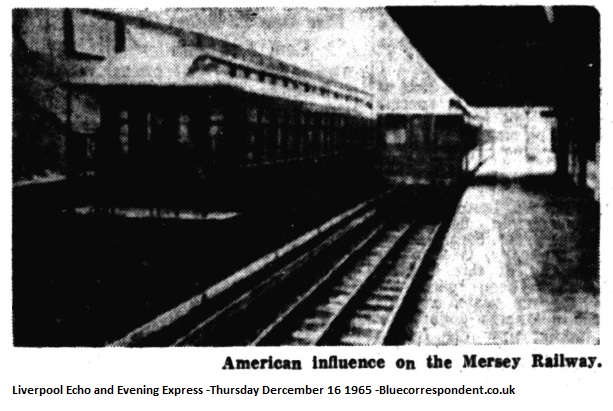
BRILLIANT BEST EXPOSED EVERTON’S NEED
The Liverpool Echo and Evening Express- Thursday December 16 1965
By Michael Charters
Among the glittering talent that is Manchester United it could be that Irishman George Best will emerge as the finest of them all. He put on the best one-man show I’ve seen this season at Old Trafford last night to play the major part In Everton’s 3-0 defeat. His personal contribution went like this: Scored the first goal; made the passes for the next two; had a header and a shot cleared off the line by Everton defenders with goalkeeper Barnett beaten. This slightly-built, untidy-looking young man, operating at outside right, but doing most of his damage down the middle. plays as though his boots possess a pair of claws to grip and caress the ball in and out of impossible situations. In addition, his genius is the type that can win a match by itself and it was this which destroyed Everton, because the score-line was not a fair assessment of the run of play.Everton, indeed, played very well—up to a point. That point was in finish where United were deadly and Everton were dreadful.United had the individual brilliance of Best, with expert aid from people like Charlton and Crerand, while Everton were a team of hard-going workers without the spark of a class performer to lift them out of the rut.
ORTHODOX
Much of Everton's play was predictable and orthodox, while United could produce more damage with one subtle pass or sudden surge than Everton could in half-a-dozen attacks. But still there was not three goals difference between these sides. There was just Best. He started Everton on theslide to defeat at the 19th minute. Before that Everton had had much more of the play, and had gone near a couple of times, notably when Pickering went through to hit a fine shot just wide. Then the centre forward, playing one of his best games this season, was pulled back by Foulkes when clean through. Instead of a likely goal, Everton had a wasted free kick. Then United struck. A square pass by Law to Crerand, and a glorious 40-yard pass by the wing half to the unmarked Best opened the Everton defence. Best drifted inside, sidestepped Wright, side-stepped Barnett as the goalkeeper came out, and slotted his shot low into the net. A magnificent goal by one of the very few really great players of the day.
IN THE GAME
Wilson stopped another shot by Best on the line before half-time but Everton were still very much in the game, if they could have found some finishing ability. But two goals in three minutes just after the interval settled the match. Best, now over on the right, drifted across a perfect centre for Herd to hit it first-time over the line, Barnett getting a hand to the ball bat failing to hold it. Then the United dazzler burst through on the left, crossed another fine centre and Charlton moved in at his leisure to blast a shot high into the net. Best was lucky with this one for I thought he fouled Harris before making the centre, but that was levelled a few moments later when his header was cleared by Wright off the line. United eased off after that and Everton, as in the early stages, had much more of the play. Better shooting, particularly by Temple, would have given them reward for excellent midfield work but they had no one to inspire them, hard and well though most of them played. Pickering and Scott were excellent, with Hurst again impressing with his promise. He was very strong on the ball and considering that he was facing England wing half Stiles, he came out of the game with great credit.
JADED
Gabriel, brought into the side in place of Young because it was thought the conditions would suit him, looked Jaded. The beet Everton players were Wilson and Harvey. The wing half covered every Inch of the pitch in his non-stop efforts, while Wilson had the class in defence which Everton so urgently need in attack. Barnett had little chance with the goals, thanks to United's accurate finishing but showed his ability with two great saves from Cantwell and Herd whereas Gregg, at the other end, often played as though he was operating a different wavelength to his co-defenders. This match, as with most Everton games, emphasised yet again the side's great need—some craft up front to be allied to Pickering's power, and a class performer in the half-back line to pull the side together in the engine room department.
LOSING NIGHT FOR FANS
The Liverpool Echo and Evening Express- Thursday, December 16 1965
SOCCER TRAIN IS 30 MINUTES LATE
Not only did Everton lose to Manchester United at Old Trafford last night, but 400 of their fans, who travelled by special train arrived half an hour after the kick-off. Their special train, due to leave Liverpool Central at, 5.35 p.m.. was 24 minutes late starting because the guard did not arrive. Then, when it reached Padgate, the steam engine broke down and they were all transferred at 7.10 p.m. to the 6.35 pm diesel service train from Liverpool which reached Manchester at about 7.50 p.m. At Old Trafford the gatekeepers stayed on duty until the Everton contingent arrived, but there was little joy for them. They had missed a third of the game and then saw their team beaten 3-0. At Padgate, British Rail reported some windows on the station were smashed. The train left Manchester at 10.10 p.m., on time, on the return journey, but arrived at Liverpool Central at 11.45 p.m.-37 minutes late. It was delayed for 39 minutes at Hunts Cross station when for the sixth, but first effective time, someone pulled the communication cord.
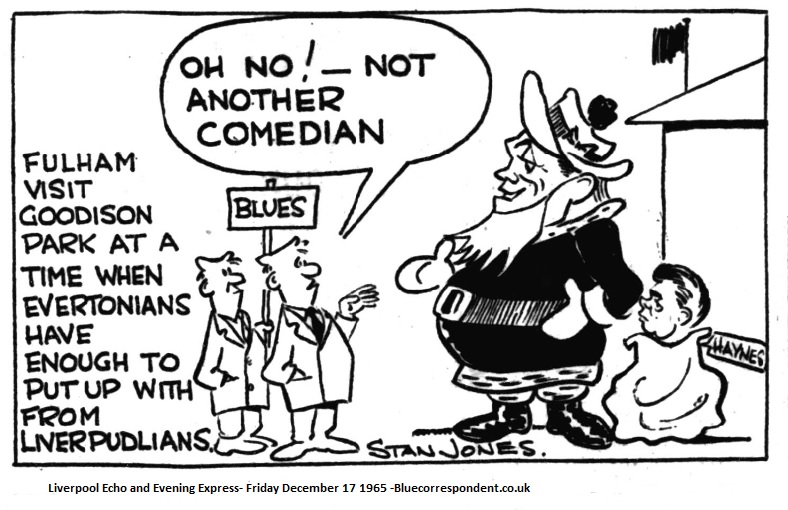
SOUTHPORT MAKE BILLY BINGHAM MANAGER
Liverpool Daily Post- Friday, December 17, 1965
Former Everton and Irish international winger, Billy Bingham, was last night appointed as Southport’s team manager. Bingham has been the club’s trainer-coach this season and the directors felt that, as he had made a success of it, he should be given the title of manager.
STRUGGLING FULHAM AT GOODISON
The Liverpool Echo and Evening Express- Friday December 17 1965
By Leslie Edwards
Everton took three points from Fulham, their opponents to-morrow at Goodison Park, in matches last season. Despite Everton's fall in the table in the past couple of months they should, if they repeat their form against Sunderland, have no difficulty with the Londoners whose position in the table is grave. Whether Young, who missed the match at Old Trafford on Wednesday, will be recalled or not is anyone's guess. Gabriel held his position in the match against United. The proximity of Christmas and Everton's successive away failures could mean that the attendance to-morrow will show an alarming drop. The Goodison Park pitch took the heavy rain which fell recently as well as most, but forking has been necessary and the going is bound to be heavy. The good-humoured rivalry between the footballing factions in this city was well exampled when a friend of mine, an Evertonian, said : "You must admit the ball has not been running for us this season it's been running into our net!" George Dunn, a one-time seafaring Scot from Birkenhead, knows how keen rivalry can be when things are going well for one club and badly for the other. He says: "Reading your article on the sway of popularity in the town over Liverpool and the decline of gates at Goodison Park reminds me that only a few years ago the boot was on the other foot—Liverpool were relegated and Everton were the toast of the town. "Being a Scot, I'm very proud of Liverpool's success. "At the time I mention when they were in the Second Division I was at sea. Our chief engineer was an ardent 'Red.' and we used to dread hearing the overseas sports round-up on Saturday nights. As most of the other engineers were Evertonians, you can imagine the number of dirty jobs the chief lined up for them on Monday mornings. I only wish I was sailing with him now ! "The other day I came across a few lines of verse I stuck on Ms cabin door after some long, dirty hours in the ship's bilges. If you print them (all right. Mr. Dunn, I won't !) please omit my name, as I could meet him on the Kop any of thew Saturdays."
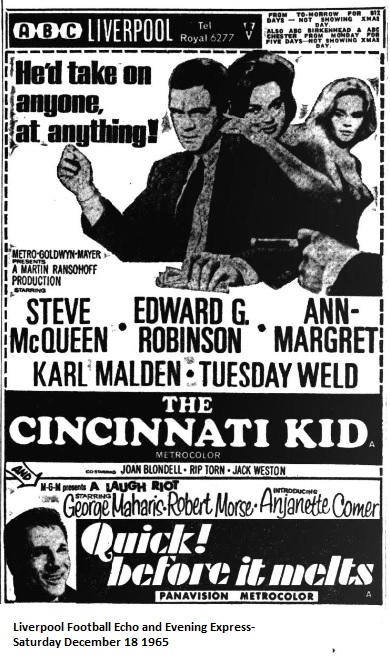
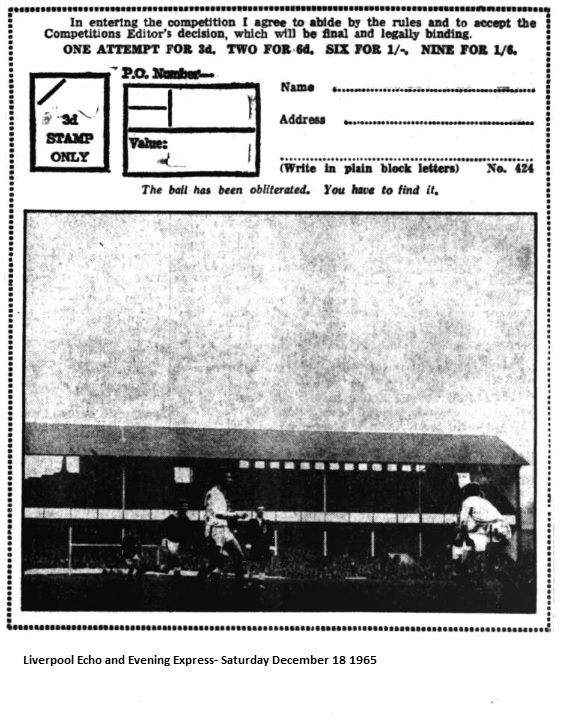
YOUNG IS BACK FOR EVERTON
The Liverpool Echo and Evening Express- Friday, December 17, 1965
GABRIEL IN RESERVES
FULHAM GAME
Everton bring back Alex Young to the team to face bottom place Fulham at Goodison Park tomorrow. This is the only change from the team which lost at Manchester Unite don Wednesday. Gabriel is dropped and plays for the reserves at Aston Villa. After missing six games through injury, Bobby Robson resumes for Fulham at right half. Pearson is included among six forwards. Everton; Barnett; Wright, Wilson; Harvey, Labone, Harris; Scott, Young, Pickering, Hurst, Temple. Fulham; McClelland; Cohen, Nichols; Robson, Dempsey, Callaghan (from) Brown, Leggatt, Haynes, Marsh, Pearson, Dyson.
Everton Reserves (at Aston Villa)- West; Darcy, Brown; Gabriel, Smith, Glover; Shaw, Humphreys, Royle, Husband, Morrissey.
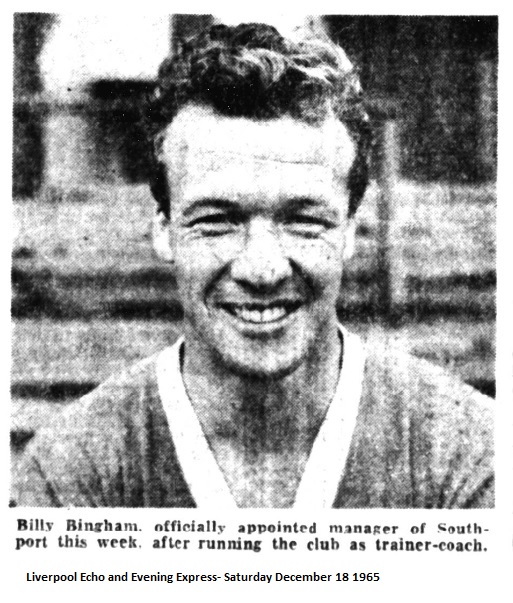
EVERTON’S v. FULHAM AT GOODISON PARK
Liverpool Daily Post- Saturday December 18, 1965
YOUNG RETURNS IN PLACE OF GABRIEL
By Horace Yates
Merseyside doubles have been few this season, but if ever there was a day suggesting victory for both Everton and Liverpool this is it. Fulham at Goodison Park and Newcastle receiving League leaders Liverpool, are both in dire trouble. As I see it, the two clubs to suffer relegation this season will be drawn from the three at the bottom of the table now, Newcastle, Northampton and Fulham. There is quite a chance that Newcastle and Northampton, promoted only last season, would be the two to drop out, although Fulham’s signs of revival are being left late. They have given few hints recently of being likely to trouble Everton unduly to-day, and while admittedly this has been a programme of disappointments for the Goodison Park side, I look for an emphatic victory from them. Fulham manager Vic Buckingham is now facing the problem which comes to most clubs in turn to decide when an ageing star is drawing too deeply on reputation to hold his place. To axe such a player always calls for courage and inevitably invites criticism. Johnny Haynes and Fulham have been synonymous for years, but the rumblings have grown in recent weeks. After recalling Jimmy Gabriel for the visit to Old Trafford on Wednesday, Manager Harry Catterick rests him to-day and restores Alex Young. This, I think, is a case of horses for courses. It was a reasonable gamble to assume that the style of Gabriel would be more effective against the rugged Nobby Stiles than the artistry of Young and even though he lacked match practice. Gabriel’s incoming was one that could easily be justified. To-day is different. The game is at Goodison Park and Young’s cleverness could be more of a problem to opposition like Fulham than the enthusiasm of Gabriel. I am glad to see that Hurst is being given a prolonged run with the seniors. This is exactly what he needs if he is to advance to first team requirements quickly.
YOUNG IDEA
He has the ability and as soon as he can speed up his play to match first team pace, Hurst could begin to pay further tribute to Everton’s encouragement of the young idea. So far as the League is concerned, Everton can obviously make no impact this season but from a reasonably safe position experiments made now can pay worthwhile dividends a little later on. Harvey and Wright have made the grade. Hurst, I think will follow their example. Had the good fortune been hit to be introduced to a winning team his advance would have been the more rapid but at least I think Mr. Catterick has the right sort of material here to make this an investment rather than a gamble. Everton; Barnett; Wright, Wilson; Harvey, Labone, Harris; Scott, Young, Pickering, Hurst, Temple. Fulham; McClelland; Cohen, Nichols; Robson, Dempsey, Callaghan (from); Brown, Leggat, Haynes, Marsh, Pearson, Dyson.
Everton Reserves; (at Aston Villa)- West; Darcy, Brown; Gabriel, Smith, Glover; Shaw, Humphreys, Royle, Husband, Morrissey.
LITTLE TO CHEERS AS EVERTON BEAT FULHAM
Liverpool Echo and Evening Express- Saturday December 18, 1965
PLAUYERS BOGGED DOWN IN GOODISON MUD
EVERTON 2 FULHAM 0
By Michael Charters

Everton; Barnett; Wright, Wilson; Harvey, Labone (Captain), Harris; Scott, Young, Pickering, Hurst, Temple. Fulham; McClelland; Cohen, Nichols; Robson, Dempsey, Brown, Leggatt, Haynes, Marsh, Pearson, Dyson. Referee.- Mr. J.C. Taylor (Wolverhampton). The combination of the nearness of Christmas and a very wet afternoon meant that Everton’s match against Fulham was watched by what looked the smallest gate of the season. The ground was exceptionally heavy and members of the ground staff were at work forking the pitch right up to the time of kick-off. First Everton move under very difficult conditions came from Pickering, who brought the ball in from the left and shot just wide. There was much scrappy play in the opening stages. A poor pass by Pickering, trying to find Young spoiled an otherwise good move by Everton but Fulham, too, were making their errors. The first real excitement came from an excellent run by Scott, but he tried to place a centre across the face of goal when he might have had a shot, and Brown was able to clear.
FULL LENGTH DIVE
Barnett had to dive full-length to make a save from Leggat, who was playing at inside left most of the time, and Everton replied with Harvey making a shot from 25 yards which went over the top. Everton took the lead after 12 minutes thanks to excellent work by both wingers. Scott cleverly dummied Nichols and made a good centre, which Temple caught first time. The ball was in the net off his right foot before McClelland could make a move. This was the sort of shot which has become Temple’s trade mark. He has been off-target in recent weeks, but made no mistake this time. Young put Everton further ahead after 16 minutes with a beautifully headed goal. It came from a corner by Temple and Young, standing only a couple of yards from the goal-line, glanced it from the finest of angles between the upright and McClelland. Although Cohen tried to keep it out, I thought the ball was over the line before the full back put it even further into the net. Labone blocked a shot by Leggat which might have been dangerous and then Marsh tried to beat Barnett with a flick shot, but got no pace on the ball and the goalkeeper made an easy save. Scott was having another outstanding game and he put one on a plate for Hurst but the youngster delayed making the shot and a good chance had gone.
OUT OF SORTS
Fulham played as though they felt that Second Division football for them was a certainty next season. They looked quite out of sorts with each other and combined football from them was almost non-existent. Following a corner by Scott, Temple missed an easier opening than the one from which he had scored. He seemed to be trapped in the mud and the ball slid off his foot for Fulham to clear. Hurst worked the ball through cleverly, then delayed his shot and Robson was able to divert it away. Pearson sent a good pass through to Leggat but a good interception by Wright stopped the Fulham forward and the move ended with a free kick for Everton. It was becoming a real physical effort to move the ball any distance in the mud down the centre of the pitch. Several times the ball stopped dead with the player going past it, unable to keep his balance. Although neither goalkeeper had much to do, Everton always looked the more dangerous, with Pickering doing a lot of good work, particularly when he took the ball down the wings.
NO MUCH BITE
Play was very ordinary now with Everton not showing much bite in attack and Fulham quite obviously incapable of doing much in a constructive sense. Haynes, playing on the right wing, was out of the game completely for long periods. Indecision by the Everton defence enabled Leggat to make a centre which Marsh headed over the bar, when he should certainly have troubled Barnett. McClelland came far out of goal to turn the ball away for a corner as Scott burst through and this had been the first moment of excitement for some 10 minutes. The game had gone as dead as the pitch! Brown, Fulham’s best player, sent a good through pass to Pearson, who headed it on to Leggat, but the Fulham forward took so long to get into a shooting position that Barnett was able to make a good save. Pickering tried to work the ball through the mud and lost in amid a sea of legs as four Fulham defenders converged on him.
SCOTT’S ARTISTRY
Scott’s artistry delighted the crowd just before half-time, but Fulham were aware of the danger he posed and had Brown dropping back to help Nichols. Half-time.- Everton 2, Fulham nil.
The game showed no improvement after half-time and there was little for the soaked crowd to get enthusiastic about. Temple made one good pass for Harvey, but the wing half shot wide from the edge of the penalty area. Temple gave Pickering the ball in his favourite position- on the left wing with only the centre half to beat and he took the ball round Dempsey neatly enough but then shot straight at McClelland. Pickering took a free kick from 20 yards which he hit with all his power along the ground, but the mud was so thick that the ball barely reached the goalkeeper.
JUST WIDE
Scott was badly obstructed by Nichols and from the free-kick Harris moved up, got his head to the ball, but just sent it wide. When a weak back pass by Robson sent the ball straight to Hurst in a goalmouth scramble, the youngster seemed to get bogged in the mud and McClelland moved out smartly to collect the ball. Scott tried to lay on a chance as he had done for the first goal by Temple. He beat his full back expertly and his high dropping centre was met by Temple’s right foot, but this time Temple directed the ball fully 20 yards wide. Everton seemed to have clear grounds for a penalty when brown brought Young down, but Mr. Taylor allowed play to go on. Wright broke up a dangerous Fulham attack by bursting out of the penalty area at top speed for one of the best individual moves of the match, which had been made almost impossible by the conditions. Pickering got a clear chance through a mistake by Dempsey and Brown, but the Everton centre forward, trying to place the ball into the far corner of the net, pushed it wide.
YARDS TOO HIGH
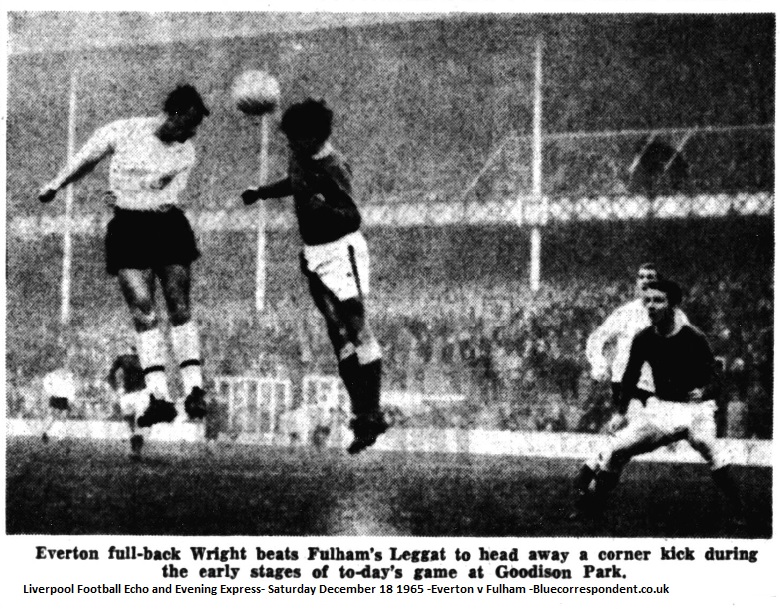
The feature of Haynes’s play had been the accuracy of his centres and he got one across for March to head on to Dyson. The little winger, however, put his volley yards over the bar. Harris and Temple worked the ball through cleverly to Young, but again in clinging mud prevented a quick shot and then Scott got over yet another fine centre to Young who out a header wide. We rarely saw Fulham in an attacking sense. Everton appeared to have the game comfortably in hand, but were not finishing well. Wright burst through with one of his incisive raids but was off target with a shot, and this was the story of much of Everton’s play- in full control but unable to put the ball in the net. McClelland flung himself out to turn the ball away after Temple had intercepted a pass in his own half and run 60 yards with the ball to make a centre intended for Pickering. With more than ten minutes to go the crowd was streaming away and no one could blame them.
WILSON SHINES
Outstanding player of the day was Wilson, who had given a classic display despite the difficulties of the rain and mud. Haynes had played much better in the second half, but Everton’s defence was rarely in difficulties. With better finishing Everton would have won by half a dozen. For the third time Harris was in the right position to make a header from a corner kick, but luck was not with him and another good effort sailed inches wide. Scott very nearly succeeded with a long-range shot, but at this stage the game had completely fizzled out. Final; Everton 2 Fulham nil. Attendance 20,670.
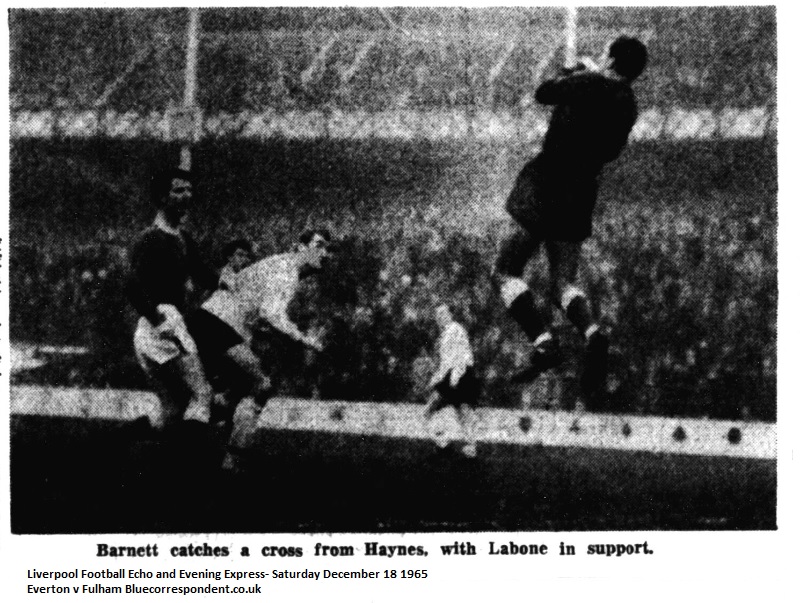
ENGLAND BACKS LIGHTEN GLOOM AT GOODISON
Liverpool Daily Post- Monday, December 20, 1965
EVERTON 2 FULHAM 0
By Jack Rowe
All the rain and all the mud at Goodison Park on Saturday could not hide the brilliance of those two England full backs Wilson (Everton) and Cohen (Fulham). We were thankful for that because this was a match which became less satisfying the longer it went, until there could have been no-one who was not happy when the final whistle blew. The 20,670 gate- the lowest at Goodison Park this season- was in a way a tribute to the football enthusiasm in the city because it was a day, and a match, which had few temptations to any except the soccer fanatic.
SEA OF MUD
Clearly it needed something to make it all worth while and in the first 20 minutes it seemed that we were going to get it. Everton produced danger with every attack they made, especially when Scott took the ball through and two goals in 17 minutes led most of us to believe that we might get a few more to provide entertainment on a dismal day. We didn’t and the fact is that if Everton could not get the goals there was precious little chance of Fulham getting them. There might be some excuse when one remembers that the pitch quickly became a sea of mud in the middle, where even the strongest player had difficulty in moving the ball, but Everton did have an opportunity of imposing their superiority and could not drive it home. True they went close on several occasions, yet it was difficult to escape the conclusion that they lacked the authority to lift themselves completely above poor opposition to a point where it could give their fans real hope when they run up against tougher sides. Above it all we did have Wilson and Cohen. Watching them in action did bring some warmth and at the end I thought there had been little difference in the merit of their performances.
SCOTT SHINES
Another who had a good day and Scott. He was Everton’s danger man and figured in two of the game’s liveliest moments, the first of which brought Everton’s opening goal. The other, in the second half, helped to show how small the margin is between success and failure of the first time drive. Temple scored first in 12 minutes and he got the chance because Scott tricked full back Nichols beautifully with a touchline dummy and went on to middle a ball which dropped beyond the penalty spot about fifteen yards out. There Temple took it on the volley with his right foot and the ball flew into the net at such speed that Fulham’s goalkeeper McClelland could do nothing else except make a token drive.
YOUNG’S GOAL
This was a goal worth seeing and the set-up became almost identical in the second half when Scott again left the Fulham defence trailing and made his centre. Again the ball dropped to Temple, but this time he took it on the half volley and away high into the crowd it went. Everton’s second goal, in 17 minutes, was scored by Young, who made the most delicate of glancing headers to a Temple corner and saw the ball finish in the net despite the combined attempts of McClelland and Nichols to keep it out. These goals killed Fulham and from then on it became a case of whether Everton would get any more. That they didn’t was frustrating and disappointing. There were chances, efforts which just missed and what appeared a clear penalty when Young was pulled down was refused but generally the match dragged itself to an unsatisfactory conclusion. Everton’s defence was never really extended in dealing with a Fulham attack which had Haynes still showing how good a passer of the ball he is, but had no punch at all. It was a pointer to this inability when the only time they got the ball into the net was from a free kick when the referee was presiding over treatment of an injured Everton player and had not signalled for the kick to be taken. Barnett gave us some clean handling and Labone was next to Wilson as Everton’s best. The attack though has got to show that it can make the most of situations all in its favour before one can regard it with contentment. The best thing about Fulham was the defence. They had a strong centre half in Dempsey, and left half Brown was another who looked out of place in this poor side. Everton; Barnett; Wright, Wilson; Harvey, Labone (Captain), Harris; Scott, Young, Pickering, Hurst, temple. Fulham; McClelland; Cohen, Nichols; Robson, Dempsey, Brown; Leggat, Haynes, Marsh, Pearson, Dyson. Referee; Mr. J.K. Taylor (Wolverhampton). Attendance 20,670.
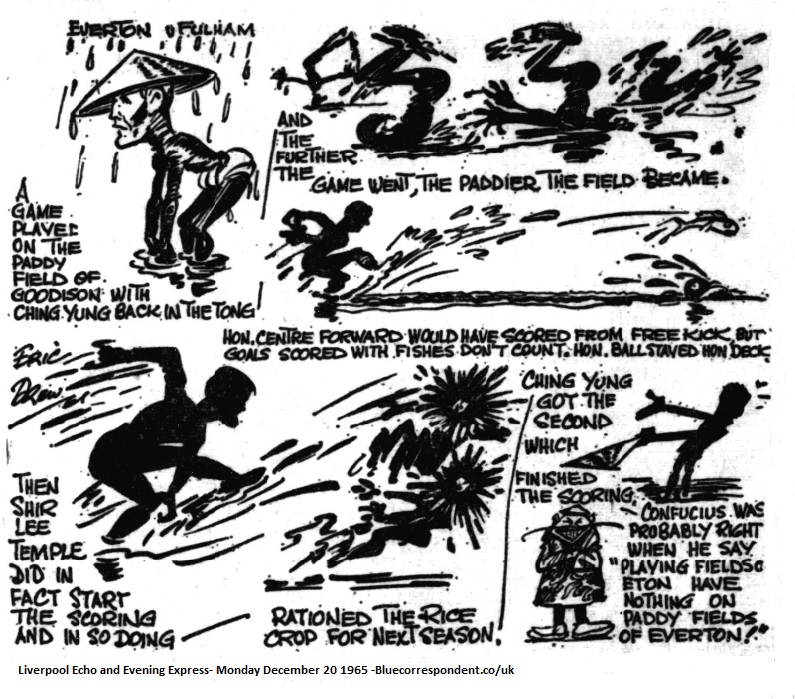
EVERTON EARN THEIR CHRISTMAS BREAK
The Liverpool Echo and Evening Express- Monday, December 20, 1965
By Leslie Edwards
Everton, heartened their followers with another well-deserved 2-0 home victory, this time against Fulham. The team now have respite until they step out at Nottingham on Boxing Day. After their latest mud-plugging effort they deserve rest and the commendation of followers who have had little enough joy this season. The signs are that Everton are about to start to climb, not dropfurther in the table. They've had a thin time for a long time, but at last they seem to have hit on the right eleven. One hopes that now Young has proved himself again he will be left undisturbed by relegations to the second team. For a time in the never-ceasing rain on Saturday the pitch at Goodison Park, which was being forked until a few minutes before kick-off time, played better than one had anticipated. Then it churned into mud, mud inglorious mud and what chance there was of fast well-contrived movement from either side disappeared into the ooze. Nevertheless, spectators of whom, miraculously, there were some 20,000 (mostly tucked away out of sight under the stands) were given an entertaining game and two brilliant goals, with some unexpectedly good goalkeeping on either side. The nature of the "going" may best be judged by the fact that the game was stopped at least three times so that players could have their eyes wiped; a Fulham player making his challenge for the ball missed it and skidded not less than 15 yards on his backside as though he had fallen on ice. Hurst, the young Everton forward, tiring of trying unsuccessfully to make the ball travel through glutinous mud finally elected to flip the ball out of the mire and then make his pass on the volley. This boy has brains!
Two quick goals
Hurst may not have had a particularly good game, but I have great hopes of him. One of his best bursts through the defence ended in his being brought down. Late in the game his deliciously astute high pass found the head of Young for what might have been the best goal of the day, but young McClelland's hands were on the ball within a split second of its leaving Young. Everton won the match in the first half when two quick goals came to them from play such as we used to see in their last championship season. Wright, with a throw in down the touchline, started the first. Scott feinted to play the ball, but let it pass and then used his superior speed to centre at his leisure. Temple volleyed the ball in, right-foot, as it dropped some 15 yards from goal. It was Temple's corner-kick a few minutes later which offered Young the difficult heading chance from which he took his goal. He flicked the ball in towards the line before it had reached the near post and although Nichols, standing on the goal-line, made contact with it he could only deflect it over the line. Everton might well have gone to a longer lead, but the more porridgy the pitch became the less chance either side had of completing their hard-worked endeavours. Temple once kicked right round the ball when standing only a few yards out; Scott, Hurst, Harris and Pickering also produced menacing shots. Young, brought down in the penalty area, got no reward from Referee J. K. Taylor, of Wolverhampton, who seems to referee a match here almost every other week.
England men
There were fine full-back performances from Wilson (Everton) and Cohen (Fulham) both England men. Haynes thought he could give Wilson two yards start and beat him in a chase for possession. He soon found that if there was to be any two yards start Wilson was the man who could give it and get away with it. Cohen, massively barrel-chested, sometimes went up the wing with the urgency and power of a fire engine. It wasn't his fault Fulham lost, nor was it the fault of Brown, a wing half-back who roamed the field to excellent effect. On such a day it was strange to find Fulham electing to try to work the ball up-field from a goalkeeper's throw. Surely in such formidably sticky conditions there should have been a long kick from hand every time the goalkeeper had this opportunity? Haynes and Marsh had an unhappy afternoon and so did little Dyson on the left wing, who mixed a lot of unsuccessful challenges for possession with some backchat with the sparse crowd. Haynes, it seems, must wheel with the ball whenever he receives it. In such conditions this was a tiring, nebulous tactic which only succeeded in losing valuable time. Marsh is an inside forward or nothing. Everton were a good side in awful conditions. Barnett, except for one mis-handling mistake, was almost faultless; Scott weaved his way past defenders as though they, and the mud, did not exist; Wright and Wilson were first-class. Temple vied with Scott as a man capable of tying the defence in knots, but sometimes overdid his runs by a few yards. Not often has Young "stayed" a heavy pitch and made so many astute through passes to give Picketing a service. Finally, when if ever before has a League player scored and been congratulated immediately by an opponent? The answer is in this match. While a player received attention with trainer and referee at hand Fulham took a free-kick and the ball, braked by the mud, just crossed the line at the far post. Shooter? Robson. Wilson immediately offered the scorer a handshake. The free-kick had to be taken again half a minute later…
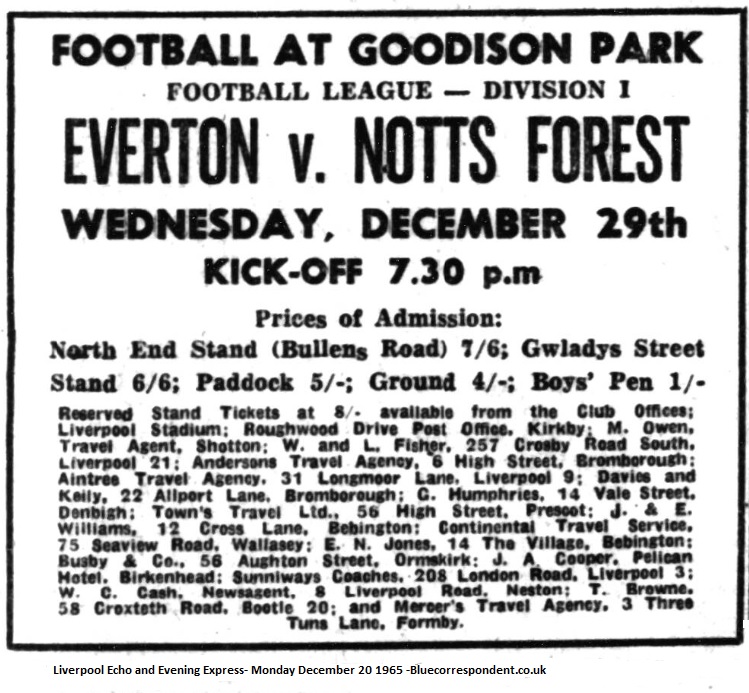
EVERTON TEAMS
The Liverpool Echo and Evening Express- Tuesday December 21, 1965
Everton Central League side meet Huddersfield tomorrow night at Goodison Park (7 p.m.)
Everton Reserves.- West; Darcy, Brown; Gabriel, Smith, Stevens; Shaw, Humphreys, Glover, Wallace, Morrissey.
Everton Youth X1 (v. Wrexham Youth team at Wrexham to-night 7.15);- Clarke; Turner, Curwen; Pearson, Kenyon, Grant; Whitehead, Royle, Tarbuck, Husband, Rutherford.
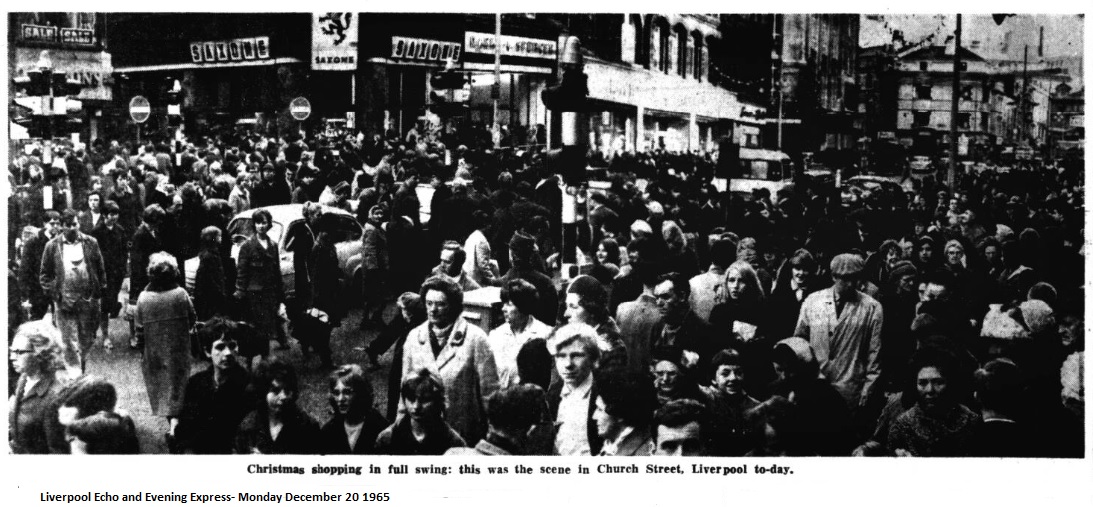
F.A.YOUTH CUP
Liverpool Daily Post- Wednesday, December 22, 1965
WREXHAM SHOCK FOR EVERTON
WREXHAM 1, EVERTON 0
Wrexham defeated Everton at the second attempt in the F.A Youth Cup at the Racecourse last night. What had looked like being a mere formality when the first tie was abandoned because of the state of the pitch when Everton were a goal in the lead a fortnight ago became an impossible job for the holders. In the first tie they looked good enough to score six goals easily, yet last night they failed miserably. The Merseysiders might have been easy winners but for tremendous work by Wrexham’s young right back Stuart Mason and goalkeeper Ray Large in the first half, when goal-line clearances also robbed Husband and Tarbuck. Having surviving, the first blitz, Wrexham gained confidence and began to make occasional breaks through Everton’s defence. Everton were the first the more skilful and better trained side, but they were control by Wrexham vigour and determination. The first tie was abandoned after 63 minutes and with enough it was in the minute that Wrexham secured last night’s winner. A free kick to John Lloyd son of Cliff Lloyd rocketed towards the net and Clarke could only push it on to the bar.
HEADED REBOUND
Centre half Graham Turner, the regular Cheshire League player and only professional in the Wrexham team, headed the rebound into the net. In the second half, Wrexham showed more initiative, concentrated on team work, and began to get more success. Despite excellent efforts by centre half Kenyon, the Everton defence could not keep out McKinlay and Griffiths. In the last fifteen minutes Everton made an all-out effort to restore the situation but Wrexham survived, kicking desperately to get the ball away. Five minutes from the end a hard shot by Husband was met with an equally brilliant save from Large. Wrexham now go to Bury in the third round. Wrexham; Large; Mason, Taylor; Cole, Turner, Jones G, Cadman, Griffiths, McKinlay, Lloyd, Blayney. Everton; Clarke; Turner, Curwen; Pearson, Kenyon, Grant, Whitehead, Royle, Tarbuck, Husband, Rutherford.
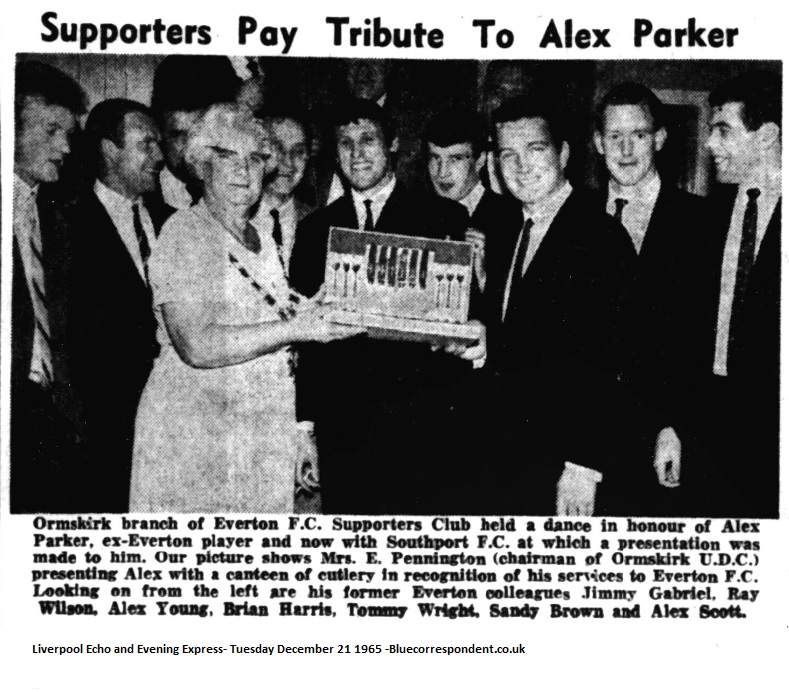
EVERTON GO OUT BY SNAP GOAL
The Liverpool Echo and Evening Express- Wednesday, December 22, 1965
Everton had a sock last night when Wrexham beat them 1-0 in the second of the F.A Youth Cup at the Racecourse. Though four of the youngsters who helped Everton win the trophy last year were in the side, the Merseysiders never quite got in their stride. Everton set off in great style and it seemed only a matter of time before they would have a hatful of goals. Tarbuck and Husband were in fine form and for the first half hour, Wrexham’s goal was saved only by clearances off the line. Having weathered that storm, with good work from centre half Turner, right back Mason and goalkeeper Large, Wrexham gained confidence and their forwards began to get an occasional break-through. In the second half a free kick by Lloyd was pushed onto the bar by Clarke and Turner headed a goal from the re-bound. It was one of the very few mistakes at Everton’s end, but it was enough to settle the game. Everton had an all-out blitz in the last 15 minutes and Wrexham had another series of escapes. When Husband shot what looked like being a certain equaliser only five minutes from the end, large saved magnificently. While Everton looked the better performers, Wrexham chased every ball and played very enthusiastic soccer. Wrexham now visit Bury in the third round. Wrexham; Large; Mason, Taylor; Cole, Turner, Jones (G); Cadman, Griffiths, McKinlay, Lloyd, Blayney. Everton; Clarke; Turner, Curwen; Pearson, Kenyon, Grant; Whitehead, Royle, Tarbuck, Husband, Rutherford. Referee; Mr. K.A. Gale (Shrewsbury).
THE COMMORDORE BEGS LEAVE TO DIFFER
The Liverpool Echo and Evening Express- Thursday, December 23, 1965
By Leslie Edwards
Frank Shaw wrote this week that the ee-aye-addeo cry of Anfield was born in 1906 when Everton fans applied it to the Sandy Young who scored the goal which won the Cup for them. I am sure I heard ee-aye-addeo chanted in respect of other things than football before it finally came into use on the Kop. Now sir Ivan Thompson, one-time commodore of the Cunard Line, begs leave to dispute the use of the addeo shout in connection with Young’s goal. He says;
“It didn’t start at Goodison. On the day Everton first won the Cup I was at Goodison Park and Everton Reserves were playing Earlestown in the Lancashire Combination. “When Young scored a boy was sent round the pitch carrying a blackboard and on which was written one word- Young.
“The crowd immediately started to shout, ‘Ee-aye-Sandy scored the goal, Sandy scored the goal, not ee-aye-addeo, which was conceived on Spion Kop.”
Mrs. Nancy Catterick, wife of Everton’s manager, is among the mothers convinced that her child is learning from watching television. Diana aged nine, usually watches from about 5,15-7-30 and until 8.30 at the week-end, depending on the programmes. Mrs. Catterick says; “We take care what she sees and I try to see the programmes first. There are a lot of programmes we object to her watching. “Danger Man” is among them. “But I do think that she has picked up a great deal of knowledge from television and that it does give children a good grounding.”
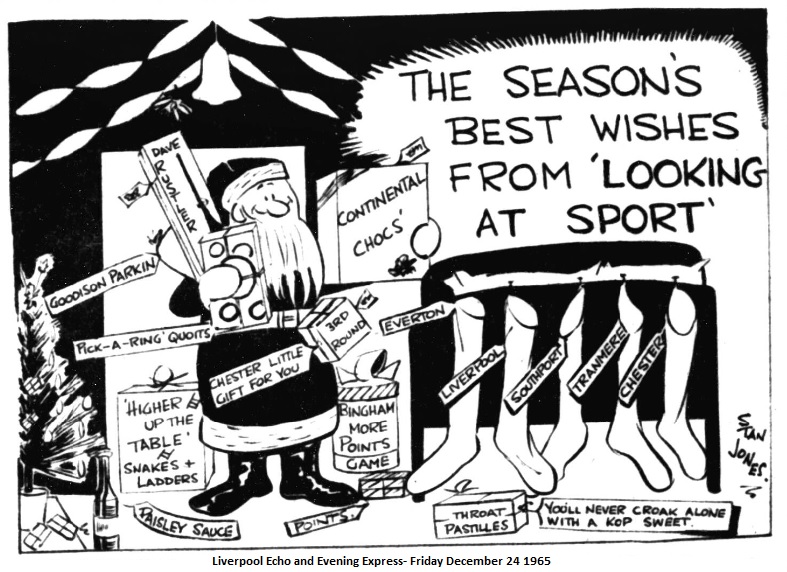
WIGANLL MAY RESUME
Liverpool Daily Post- Friday, December 24, 1965
DRAW NOT BEYOND EVERTON
By Horace Yates
In those far away days of August when the first League table of the season was published Nottingham Forest led the way, but it is a position from which they have progressively retreated ever since. On Monday they receive Everton in a position nearer the bottom of the list than the top. They have only 18 points from twenty-one games, but Everton’s boast of 21 points results from two more games played. Manager Harry Catterick has not announced any probable Everton side so far but unless he decides on the substitution of Gabriel for Young, or West for Barnett, I don’t expect to see any change.
WIGNALL BACK
Former Everton centre forward Frank Wignall, who has not played since he limped off the field at Anfield on October 30, is included among eight forwards from whom the attack will be chosen. Because of injury Wignall’s contribution to Forest’s scoring tally is only half that of last season, but nothing would suit him better than to make his come-back against his former colleagues. John Barnwell and Ian Moore join Wignall in contending for a place. Forest are obviously a far different proposition at home than they are away, for while only Arsenal and Aston Villa have won at City ground, their haul on opponents’ grounds is a mere four points- and they still await their first victory. Everton’s performances away from Goodison are no more encouraging, although they can at least show one success. Since these teams last clashed, Forest have added to their strength Welsh international half back Terry Hennessey, formerly with Birmingham City. When Hennessey became available for transfer it was freely reported that Everton would make efforts to sign him, but an official statement from the club denied this. It is a mark of Nottingham’s lack of fire power that despite his lengthy absence Wignall’s five goals place him in second place in the home team’s scoring register. Addison leading the way with seven. If Everton really are on the way back this their chance to prove it. Outright victory may be expecting a shade too much but a division of points should certainly not prove to be beyond them. Nottingham Forest; Grummitt; Hindley, Newton; Hennessey, McKinlay, Whitefoot; (from) Crowe, Addison, McArthur, Chapman, Hinton, Wignall, Moore, Barnwell.
EVERTON AT NOTTINGHAM
The Liverpool Echo and Evening Express- Friday, December 24, 1965
By Leslie Edwards
Liverpool have the return game at Leeds on Tuesday… too quick, a return, maybe, for what could be a contentious match. Everton, on the other hand, go to Nottingham Forest, the side of their former manager, John Carey, on Monday and have the return fixture at Goodison Park on Wednesday. Manager Catterick is taking the precaution of having his players come to Goodison Park on Christmas Day for a training stint. I think it unlikely he will change in any respect the eleven which beat Sunderland and Fulham. Everton beat Forest 1-0 at Goodison Park last season, but lost at Nottingham by 3-1. After beginning the season with great promise Forest have dropped many places in the table, mostly from their inability to win away. They are still a good side on their own pitch, however, and Merton will be hard put to it to get a point, much less victory.
EVERTON TEAM DELAY
Everton’s team to play at Nottingham Forest on Monday will not be chosen until later. The postponed Everton v. Huddersfield Town central League match will not be played on Monday.
LITTLE TO OFFER IN ATTACK
Liverpool Daily Post- Tuesday December 28, 1965
EVERTON GET OFF LIGHTLY AT NOTTINGHAM
NOTTINGHAM FOREST 1, EVERTON 0
By a Special Correspondent
Everton, well below form, showed no likings for the hard underfoot conditions at Nottingham and were beaten more easily than the score indicates. Forest, playing well above their usual standard, should have had two or three more goals on the run of play, for they were the complete masters in the opening half after Fred Pickering and Alex Scott had opening half after Fred Pickering and Alex Scott had opened in promising style for the visitors. But once Pickering had been mastered Everton had little to offer so far as their attack was concerned, and their defence was often caught in two minds by the quick-moving Forest forward. Oddly enough Forest’s best attacker was a full back. Twenty-two-years-old Henry Newton, recently given the new role of left back, gave a superb display in addition to scoring the only goal in the 13th minute. John Barnwell made a long throw-in on the left and Newton raced up-field to take the ball in his stride. Tom Wright challenged but the forest man lobbed the ball over the Everton player’s head, ran round him and drove an unstoppable shot past Barnett. Twice afterwards in the first half Newton went close to repeating the feat with drives that were narrowly off target. It was well for Everton that Ray Wilson and Geoff Barnett kept their heads during strong spells of pressure by Nottingham.
GREAT SAVES
Forest owed a lot to the enterprise and skill of right half Terry Hennessey and inside left Barnwell who used the ball superbly in the open space and gave and uneasy Everton defence a bad afternoon. Yet for all their monopoly of early exchanges the Forest forwards could not force a way through. Colin Addison twice went near however during this spell. Once his angled drive beat the Everton goalkeeper but the ball hit the far post and later, from a bare yard or two out, he shot straight at Barnett. The Everton goalkeeper twice made superb saves after this, both at the expense of former Everton centre forward Frank Wignall, back on duty for Forest after a long injury lay off. On each occasion he raced yards out of goal to smother the ball as the Forest man was careering goal-wards.
CROWE ERRACTIC
It was not until the restart that Everton really got into the game. Then their forwards swarmed all round the Forest goal for a 15 minutes, spell which might easily have brought an equaliser. Peter Grummitt made a superb save from left winger Derek Temple after saving smartly from Alex Young who shot through a crowd of players. Everton moved much more smartly to the ball in this spell but their effort was short lived and soon Forest were applying the pressure. But, with Alan Hinton off form on the left wing and Chris Crowe somewhat erratic and seldom getting the better of Wilson, most of the home attacks broke down at the edge of the penalty area. Those that looked like achieving something always faded out when Barnett and Labone challenged. Labone after an indifferent first half, improved tremendously near the end, but so far as Everton were concerned Barnett and Wilson shared what few honours went the visitors’ way.
WRIGHT BOOKED
Near the end a curious incident resulted in the Everton right back Tommy Wright being booked by the referee. Taking a throw-in on the right he was twice warned about “stealing” ground and on the third occasion had his name taken. Before the match began a youth ran on the field and, together with half a dozen others in the crowd behind the Forest goal, was escorted out of the ground by the police. Nottingham; Grummitt; Hindley, Newton; Hennessey, McKinlay, Whitefoot; Crowe, Addison, Wignall, Barnwell, Hinton, Sub McArthur. Everton; Barnett; Wright, Wilson; Harvey, Labone (Captain), Harris; Scott, Young, Pickering, Hurst, Temple, Sub Stevens.
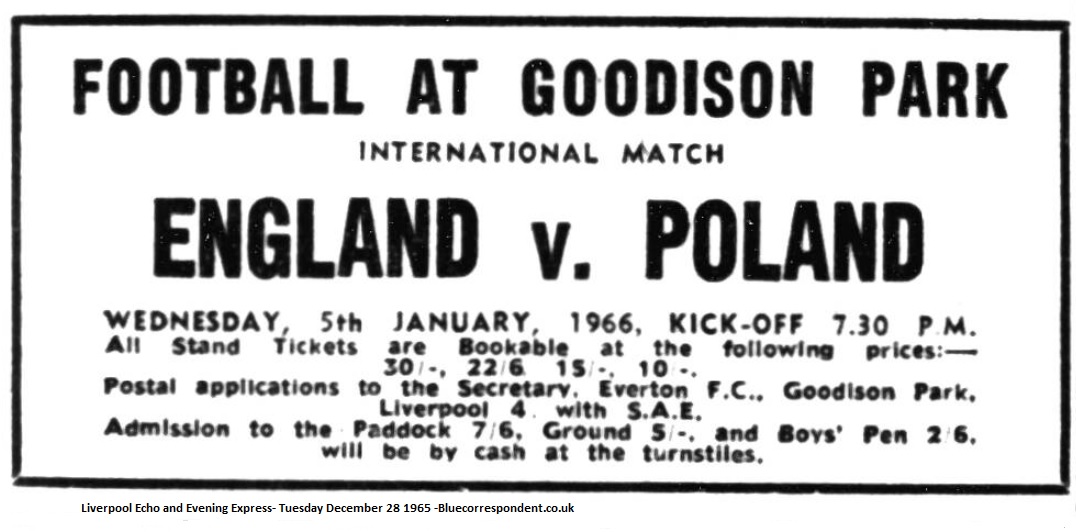
TWO MORE AWAY POINTS SLIPPED AWAY FROM EVERTON
The Liverpool Echo and Evening Express- Tuesday, December 28, 1965
By a Special Correspondent
Despite a 15-minute onslaught on the Forest goal at the beginning of the second half and a last ditch rally in the final five minutes, Everton could not complain about leaving the points behind at Nottingham yesterday. In a most one-sided first half Everton spent about 40 minutes on the defensive and yet went in for the break trailing by just one goal. Put It down to the good timing of goalkeeper Geoff Barnett or the inaccuracy of the home attack that made so little difference to the score line but territorially this was one game when Everton played second fiddle. When Everton came out 15 minutes before the kick-off to try out the frost bound pitch and size up the situation much was expected of them—but they were left skating in circles and a Whitefoot-Hennessey inspired Forest slipped through Everton's non too sure defence. Wing halves Whitefoot and Hennessey were the all-important difference between the sides. Everton's pair of Harvey and Harris were too busy in defence to hardly think about attack and Pickering played a lone, despairing part. LONE BATTLE
Given little scope by Forest's big centre half McKinlay, Pickering often fought a solitary battle in the
quest for goals although Young twice caught Forest unawares and one 25-yarder skidded out of goalkeeper Grummitt's hands for a corner when it deserved a better fate. For every Everton near miss however, there were at least three for Forest. But as the game progressed the visitors settled down well in defence after a poor opening when Wright. Labone and Wilson all failed to cope with a tricky Nottingham attack. Wright had a particularly tough time. Hinton's speed was often too much and he was left chasing shadows. To crown a black day, Wright had his name taken by Rotherham referee Mr. D. W. G. Brady over a throwing incident.Labone and Wilson improved the longer they played and Wignall did not have it all his own way on his return to the Nottingham side after a seven week layoff following an injury at Anfield. Yet the faults were overlooked in a game that sparkled as much as the heavy frost which covered the pitch.Forest's largest crowd of the season were roused to long bouts of applause by the play of both sides.
HOLES IN DEFENCE
Who said good football is impossible in such conditions? Forest and Everton disproved that theory, risking neck and limb every time they tackled. But it was all good clean stuff. Not satisfactory, however, for the ardent Everton fan looking for a change of fortune in the Goodison side's away record. There are too many holes In defence, not enough snap in attack, and too much time spent in settling down. It was in that vital opening spell that Forest scored. What went wrong with Everton's marking system when Barnwell took a throw-in no one will know. The ball bobbed into the open space and left back Newton was allowed to stroll on to it and hit the ball hard and low past the stranded Barnett for an opportunist goal in 13 minutes. Everton defenders could only stand and watch as another two away points slithered away.
STEVENS TRANSFERRED TO OLDHAM ATHLETIC
The Liverpool Echo and Evening Express- Tuesday, December 28, 1965
EVERTON AGREE TERMS AT £20,000
UTILITY PLAYER
By Michael Charters
Dennis Stevens, the Everton utility player, was transferred to Oldham Athletic this afternoon for a fee in the region of £20.000. The clubs agreed terms this morning and Stevens went to Oldham to discuss terms. He signed after lengthy talks, having refused to join the Lancashire club last week after Oldham had made their first approach for him. Stevens joined Everton from Bolton Wanderers, his first League club, in March. 1962, for a fee of about £25.000. He quickly became a regular in the first team at inside right following the transfer of Bobby Collins to Leeds United and won a Championship medal in 1963. After another full season as la first-team regular, he switched to wing half, and 'also played at full back on occasions. Last season, however, he was in and out of the League team playing in only 18 League matches. With youngsters like Cohn Harvey and John Hurst nowholding regular places in the Everton first team. Stevens has made only rare Logue appearances this season. Stevens, now 31, made his League debut for Bolton in 1953, and his transfer to Everton nearly four years ago was a surprise, because he seemed a fixture at Burnden Park, never being out of the first team. A native of Dudley, he is a cousin of the late Duncan Edwards.
WHEN BUNNY HIT THE HEADLINES
The Liverpool Echo and Evening Express- Tuesday, December 28, 1965
By George Harrison
The quarterly " Canmmell Laird Magazine," which has been published by the shipbuilding firm for nine years, ceases publication with the current issue, and in an editorial note there is the comment: "To fit themselves for the struggle ahead, the companies have had to embark on rigorous economies. Everything which is not absolutely essential to their activities has had ruthlessly or regretfully, to be thrown overboard. And that includes the 'Cammell Laird Magazine." However, before the curtain fell, the magazine managed to revive in an article memories about one of the company's employees. Bob Bell, of their stores and traffic department at Rose Brae
Thirty years ago almost to the day—on December 26, 1935—Bob Bell suddenly hit the nation's sports headlines with a bang. He had been a boy footballer at school in Birkenhead and then in junior competitions in Liverpool and Tranmere Rovers became interested in him. He was signed on by Rovers, played soccer on Saturdays and kept on his job in a shipping office. On Boxing Day, 1935, Tranmere Rovers were at home to Oldham Athletic. Rovers won, 13-4, and of those 13 goals. Bob—or "Bunny " as he was nicknamed--scored nine to establish a new individual scoring record for the Football League. He missed a penalty, too. The crowd carried him off the field in triumph. Four weeks later, at a civic reception in the Town Hall, he was presented with the ball with which he had accomplished his remarkable feat. And the following year he moved into the big time. He was signed by Everton. The war put an end to his playing career and Bob Bell slipped into the background. But one thing is certain. He will never be forgotten by Tranmere fans.
FOREST LOOK FO THEIR FIRST AWAY VICTORY
The Liverpool Echo and Evening Express- Wednesday, December 29, 1965
Everton, beaten 1-0 at Nottingham on Monday, tackle Forest again this evening at Goodison Park. The Everton turf-warming apparatus should make the pitch playable where in other cases there might be doubt about a fixture. Forest, whose approach play is invariably good are not strong finishers. It is significant that they are one of two First Division teams—Fulham are the other-who have not won an away match this season. Their away bag consists of points from four drawn away games. Forest came through the Monday game with no serious injuries and so the one-time Everton centre-forward. Frank Wignall, who has just returned to the side after injury will have a chance against his old team-mates. Forest have a speed merchant who centres the ball brilliantly, in Hinton: their half-back strength now Hennessey has joined them is first-class with Whitefoot, once of Manchester United, the general great creator of attacks. As an extra attraction to the Christmas matches and further opportunity to enable Everton to show that they can pick up points at home to-night's game Is welcome. Everton fans are itching for signs of their side's rehabilitation. With Scott playing well and Young coming back to his best this is an appropriate time for the long looked for revival. Forest. under the guidance of former Everton manager. John Carey, are an attractive side and started the season well, but while Wignall has been absent from the side there has been little punch and little success.
EVERTON GAME OFF
Liverpool Echo and Evening Express- Wednesday, December 29, 1965
Match referee declared Goodison pitch unplayable for to-night’s Everton -Nottingham Forest game. Pitch waterlogged.
WANTED -A SCHEMING INSIDE FORWARD
Liverpool Echo and Evening Express- Thursday December 30, 1965
By Leslie Edwards
Derek Murphy, 174 Score Lane, Childwall, sees Everton's problems this way:— "For several years we Everton supporters were cajoled into believing that their team was to become supreme in English football but now surely that myth has been shattered. Although I stopped going to Goodison several months ago I have watched with sorrow their decline. Whilst I anticipate that the thrilling games across the Park will be matched by some equally sterling relegation tussles at Goodison, I feel very disappointed with the complacency of the Everton management. "It was as obvious last December as it is this that Everton's greatest need is a scheming inside forward and only the most hopeful of optimists would have foreseen a member of the Youth side fitting the bill. No effort has been made, however, to obtain such a player though several, notably Alan Ball, have been on the market in the past year. Until such a player is bought I'm sure many fans will show their disapproval of the team's mediocrity by staying away. "I do not by any means deprecate the youth policy but these youngsters can learn most with the help and inspiration of good. experienced professionals. Until these men are bought I fear Everton's grandiose youth policy will prove fruitless." "As a supporter for 15 years." (says N. McCrudden of Huyton)"I was very interested in Mr. A. E. Seattle’s letter in your column. I entirely agree on Ray Wilson as skipper. He is a world-class player with all the qualities of leadership, drive and spirit required by Everton at the moment. If they are to achieve the Cup they must find that lost team spirit. "Now Harvey has found his rightful place at halfback with Harris, Young should be allowed to play forward, not back in defence. This is not required with Harvey's service to forwards."
EVERTON LIKELY TO SIGN FORWARD FROM PLYMOUTH
Liverpool Echo and Evening Express- Thursday, December 30, 1965
£20,000 FEE AGREED FOR TREBILOCK
TRAVELLING TO GOODISON TO DISCUSS TERMS
TRANSFER EXPECTED
By Leslie Edwards
Mike Trebilcock, Plymouth Argyle's inside forward. is travelling to Liverpool to-day and, subject to being offered suitable terms, will be an Everton player within the next 24 hours. Agreement between the clubs was reached on the telephone between Harry Catterick of Everton, and Derek Ufton, the one-time Charlton half back, this morning. Trebilcock, who is unmarried and 21 years old, is expected here at 5 p.m. He is 5ft. 8in, and weighs 11st. Mr. Catterick has watched him play three or four times and thinks he has a fine future. Coloured Trebilcock, born at Gunnislake, in Cornwall, injured an ankle in the match against Derby County on Monday, and would have missed last night's return match against Derby had it not been postponed.
MEDICAL TEST
Assuming Everton offer the player terms to which he will agree, he must pass the club’s medical examination before the deal is completed. Mr. Catterick would not say whether or not Trebilcock would be in the team to go to Tottenham on Saturday, but he admitted that if the new player were fit from his ankle knock, he would certainly come up for consideration. This would be the first signing Everton have made In the last eighteen months (since full back Wilson joined them from Huddersfield) in which they have received £120.000 for players transferred. Stevens went to Oldham earlier this week at a fee of £20.000. Trebilcock. for whom Everton will have to pay around £20.000. has been the subject of inquiries from other clubs, notably Norwich City and Coventry City.
GREAVES STYLE
He is on the small side, but Plymouth Argyle fans see him as a player with the potential of a Jimmy Greaves. He resembles Greaves in style. He is a goal poacher, exceptionally quick off the mark and with a good positional sense. Plymouth reports say that a good half-back can make Trebilcock pay good scoring dividends. He is usually the inside forward who gets the goal at Plymouth, who play a system with only three forwards at a time upheld. With Young occupying oneinside forward position atGoodison Park,the prospects are that Trebilcock will challenge the promising John Hurst for a place in the senior team at inside-left. Trebilcock Joined Plymouth three seasons ago and once he gained a place in the team delighted the crowd with his dramaticbursts into scoring positions. Trebilcock was Argyle's leading scorer last season with 15 goals and has scored ten goals this season.
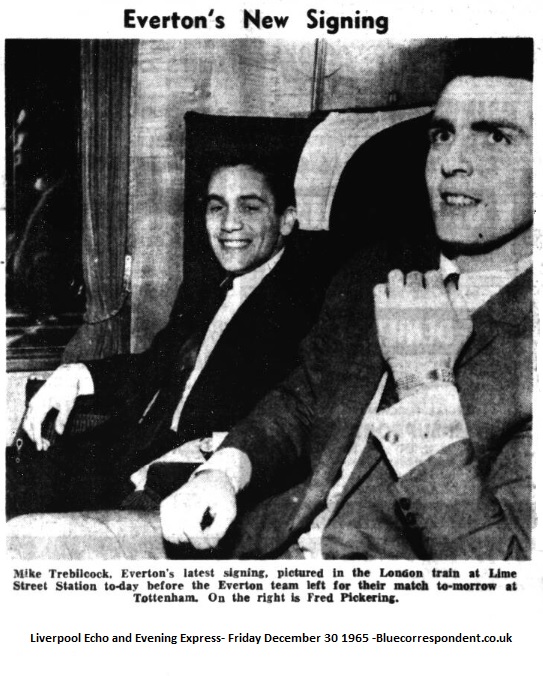
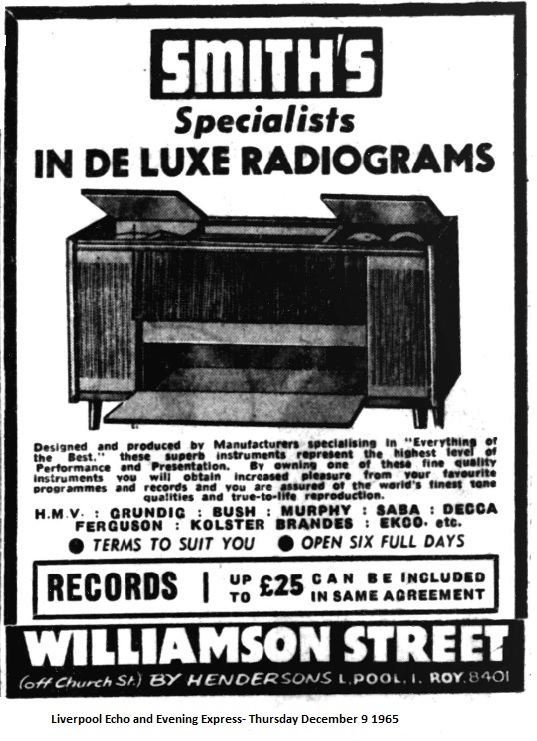
MATCH DAY PARKING CHAOTIC SAYS M.P
The Liverpool Echo and Evening Express- Thursday, December 30, 1965
MOVE POLICE TO TACKLE IT
COMPLAINTS
Mr. James Dunn, Labour M.P for Kirkdale, said to-day that well-muscled men from the ranks of private citizens should be recruited by Liverpool and Everton Football Clubs for crowd control at Anfield and Goodison Parks, to free the police to tackle car parking chaos outside the grounds. If the police still needed more help, then traffic wardens and a fixed penalty payment of fines for parking offences should be introduced around the grounds to prevent streets being choked by indiscriminately parked vehicles. Mr. Dunn advocated the immediate withdrawal of police from duty inside the soccer grounds of the city. Vehicle congestion in the side streets within easy distance of the grounds had to be seen to be believed on match days, said Mr. Dunn. It hazarded road safety and caused considerable nuisance to residents of those streets. He was repeatedly getting complaints and he had drawn the problem to the attention of the city police. Mr. Dunn said; “On Monday, when Liverpool were at home to Leeds United, I made a tour of the streets within easy reach of the ground, and saw for myself the utter chaos of parked vehicles.” The Anfield ground is in Mr. Dunn’s constituency, and Goodison Park just outside.
VIEWS OF CLUBS
Mr. S.C Reakes, chairman of Liverpool F.C., said last night; “It would not be possible to get anyone to do the job of control inside the ground better than the local police force. Mr. E. Holland Hughes, chairman of Everton F.C., said he did not think that police control could be equalled in any other way. “The use of local policemen inside football grounds is in accordance with recommendations of the Football Association, which we adhere to.” A police spokeman said that an official report regarding the traffic situation had been submitted to Liverpool City Council, and was to be studied during the next week or so.
£20,000 MIKE TREDILCOCK MAY MAKE DUBUT TO-MORROW
Liverpool Daily Post- Friday, December 31, 1965
EVERTON SWOOP TO SIGN INSIDE FORWARD FROM PLYMOUTH
By Ian Hargreaves
Everton ended a spell of eighteen months, financial inactivity by signing Plymouth Argyle’s twenty-one year old inside forward, Mike Trebilcock, for £20,000 last night-a record fee for Argyle. Trebilcock, a small, swift-moving player in the Greaves mould, travelled up to Liverpool yesterday after the fee had been agreed between the clubs, and then agreed personal terms with Everton manager Harry Catterick. Born in Cornwall, he joined Plymouth in 1962 at the age of seventeen and was quick to claim a first team place. His marksmanship soon made him a marked man in the Second Division, and though he has suffered from lack of support, he has been the club’s leading scorer during the past two seasons.
BEST STILL TO COME
Last season he obtained fifteen goals in thirty-eight matches, and this one he has already hit eleven in twenty-one, including a hat-trick. The feeling in Plymouth is that the best has still to be seen of this versatile forward with the eye for an opening. A newspaper friend there told me yesterday that Trebilcock was generally considered to have considerable potential, and that it was thought of the player’s future (as well as of the large fee) that finally persuaded Plymouth manager Derek Ufton to let him go. Typically, Mr. Catterick has been watching his new player for some time without giving the slightest clue to his intentions. I understand he has seen Trebilcock play three times this season since he was first recommended, and that her swooped in the nick of time to defeat determined rivalry from Joe Mercer at Manchester City and Jimmy Hill at Coventry-both excellent judges of a footballer.
MAY PLAY TO-MORROW
It is just possible that Trebilcock will make his debut to-morrow in the vital match at Tottenham, whom Everton haver already defeated at Goodison. He injured an ankle in the match with Derby on Monday, but the damage has been responding to treatment, and if he is fit in time it seems likely that he will be given an immediate opportunity to find his feet in top company. Everton’s move ends a spell of eighteen months since they signed England full back Ray Wilson, during which they have withstood the temptation to splash money on reinforcements and tended to concentrate on developing their own players. Although several promising youngsters have emerged notably Harvey, Hurst, Barnett, and Husband, it wad clear that something drastic would have to be done if the club’s slide down the First Division table was to be halted and that inside forward was the first position that needed to be strengthened. The only surprise is that a comparatively inexperienced man, who is primarily a goal scorer rather than a goal maker, should have been signed, instead of an old hand capable of acting as general. However, Mr. Catterick has made it obvious he considers it almost impossible to obtain a ready-made star of this kind at the moment, and he is probably hoping that Trebilcock’s present will take some of the weight off Pickering who has been marked comprehensively since his arrival from Blackburn. Whatever his reasons, Everton supporters will greet with relief this fresh indications that their club are not blind to their problems which seem all the worse when contrasted with the consistent success being achieved by their Anfield neighbours.
EVERTON AT CROSS ROADS
The Liverpool Echo and Evening Express- Friday December 31 1965
By Leslie Edwards
Everton took three points from Spurs last season and hope to-morrow to repeat their 2-2 draw at White Hart Lane. Spurs are within easy challenging distance of the League leaders and, like Manchester United, seem to have got together a durable, dependable team. There is no doubt that the standard of club sides in Britain has improved remarkably in the last few seasons. Time was when we complained that most teams fielded only one or two established players of international class. Now, when one considers Liverpool, Leeds, Manchester United, Spurs and others it is clear that we are nearing the pre-war situation in which teams had half-a-dozen or more notables. British football has come on remarkably in the tactical sense, too, after learning painfully slowly from Continental rivals who thought longer, harder and better about these problems. But even now. I submit, some managers are slow to adapt their tactics and techniques to suit freak pitch conditions. You can't play your usual type of game on a pitch as hard and bumpy and unresponsive to finesse as some used over the Christmas holidays. Everton are now figuring—though the postponement of the Forest game is probably the reason—in the lower half of the table. Spurs' good home record makes their task to-day a difficult one, though when the London side came to Goodison Park earlier this season an Everton which included the youngsters Husband and Hurst scored an unexpected victory. Everton are at the cross roads. Their home performances recently have been encouraging. But until they start to pick up away points they can't expect to move up the table. An irate Everton follower from Old Swan was one of many, unhappily, who travelled to Goodison Park in vain for the Everton v. Nottingham Forest match. " Surely." he says. "Everton could have let people know that the match was off at lunch-time since it did not rain all that much in the afternoon ?" Point is added to this by the fact that my reader, speaking to busmen. was told that the special buses to the ground were cancelled at lunch-time. All I can add to this topic is that the Echo printed the postponement news within a few minutes of its being received in this office at 4.10 p.m. I understand the referee did not arrive for the inspection until 4 p.m.
TREBILCOCK MAY PLAY
The Liverpool Echo and Evening Express- Friday December 31 1965
WITH EVERTON TEAM AT TOTTENHAM
By Michael Charters
There is a reasonable chance that Mike Trebilcock, Everton's £20,000 signing from Plymouth Argyle last night, will play at Tottenham tomorrow. Everton manager Harry Catterick said that Trebilcock, who injured an ankle playing against Derby County on Monday, trained with the other Everton players this morning. He added: "Trebilcock has done little training this week but he is travelling with the Everton party to London to-day and, depending on the state of the pitch, he may play in one of the inside forward positions. I will select the side after I've seen the White Hart Lane ground to-morrow. Thirteen players made the journey—the team which lost at Nottingham Forest on Monday plus Sandy Brown and Trebilcock. Everton (from)—Barnett; Wright, Wilson, Brown; Harvey, Labone, Harris; Scott, Young, Pickering, Hurst, Trebilcock, Temple. Tottenham manager Billy Nicholson is undecided whether to play Cyril Knowles or Ron Henry at left back. Both are named for the position in an otherwise unchanged team. Tottenham. Jennings: Beal, Knowles or Henry; Mullery, Brown, Mackay; Robertson, Clayton, Saul, Gilzean. Jones.
Everton Res (v. Manchester City, at Goodison Park)- West; Pearson, Darcy; Gabriel, Smith, Glover; Shaw, Royle, Humphreys, Husband, Morrissey. Evertor say that tickets for the postponed game with Nottingham Forest will be valid for the match when it is played, but anyone can have their money refunded if they desire.
December 1965